#bad buddy: meta
Explore tagged Tumblr posts
Text
Danny Is An Alternate Version Of Ra's Al Ghul And Flash Already Called Dibs On Adopting Him
Danny In All His Sleep Deprived Slightly Scuffed Up From A Fight Glory Is On His Way To Clockworks Tower To Hopefully Get A Nap And Maybe Some Homework Done When A Natural Portal Opens Up In Front Of Him And Proceeds To Unceremoniously Drop Him In The DC Verse Just Outside Of Central City Before Promptly Closing Leaving A Tired Danny Behind In A Run Down Abandoned Parking Lot.
It's Times Like This When Danny Regrets Putting Off Learning How To Make His Own Portals, Cause Now He Is Very Much Stuck For The Foreseeable Future And He Has No Idea Where Or When He Is. Luckily For Him However Central City Isn't Too Far Away, Unlucky For Him However Is That Once In The City He Realizes This Isn't His Dimension. He's Pretty Sure He'd Remember Something Called The Justice League.
So What Do You Do When Supernatural Bullshit Fails You? You Fall Back On Your Mad Scientist Roots And You Make A Portal Gun. So That's Exactly What Danny Plans To Do.
Unfortunately Staying Alive And Building Questionably Safe Portal Technology Requires Money And Supplies, So He Ends Up Wandering From City To City Doing Odd Jobs/Fixing Up Busted Tech For Cash Or Unwanted Electronics For His "Operation: Get Home" Needs. This Obviously Ends In A Few Superhero Encounter Shenanigans.
Though He Always Ends Up Back Near Central City, Both On The Off Chance The Natural Portal Will Open Up Again And Because Out Of All The Superheroes That Apparently Exist In This Universe The Speedsters Are His Favorite (Red Robin Is Solidly His Second Favorite Ever Since The Gotham Vigilante Gave Him A Large Coffee Filled With Enough Caffeine To Kill A Man).
Unbeknownst To Danny However Is That Every Hero/Vigilante He Has Encountered Has Come To At Least One Of The Following Conclusions; 1. Run Away Meta Who Is In Desperate Need Of A Good Meal/Adoption Bait. 2. Possibly Red Robin/Tim Drake Clone 3. A Good Kid But Could Possibly Be A Future Rouge If Left Unsupervised. 4. Did Bats Get A New Kid And Why Is He Here?
All Flash Knows Is That He Saw The Kid First And Therefore Has Dibs. Suck It Bruce.
Fast-forward A Few Months And Danny Gets Hurt During A Rogue Attack While Trying To Help Some Civilians Get To Safety (Old Hero Habits Die Hard (Ha Die Hard) And All That Jazz) And He Nopes Out Once Everyone Is Safe And When The Paramedics Are Busy With Other People Unaware He Left A Blood Sample Behind.
One DNA Test Brought To You By Paranoid Bat Concerns Of A Possible Red Robin Clone Later And They Find Out That Dannys DNA Matches One Ra's Al Ghul.
They Now Think Danny Is An Escaped Ra's Al Ghul Clone.
Memes For The Vibes:
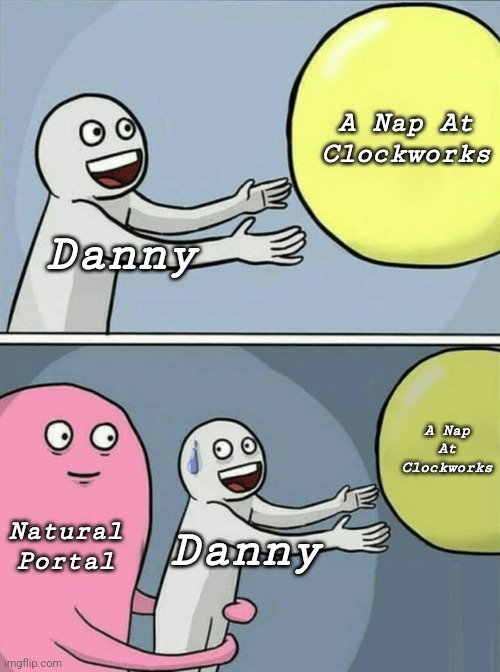
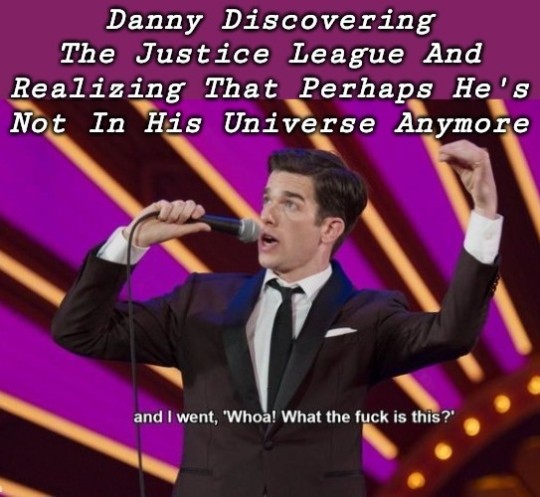
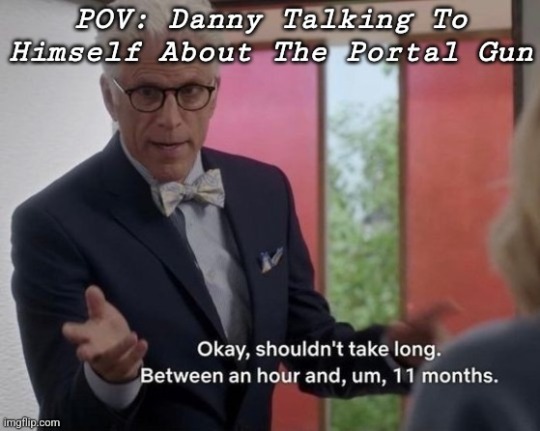
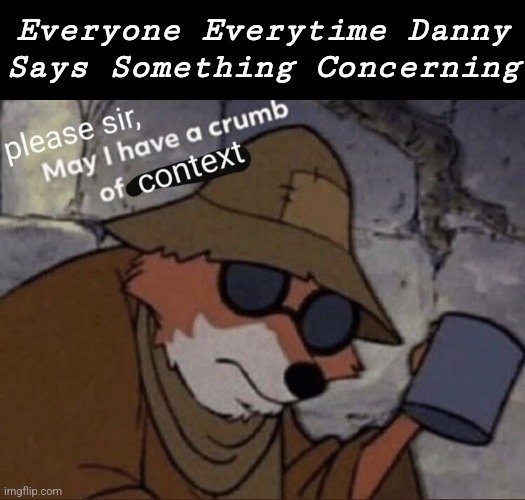
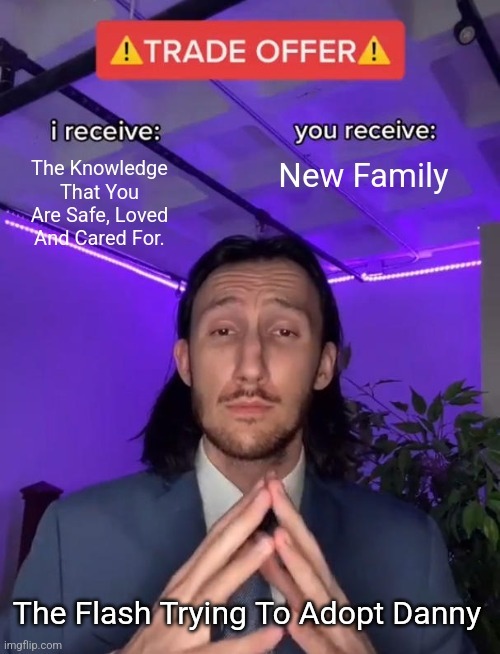

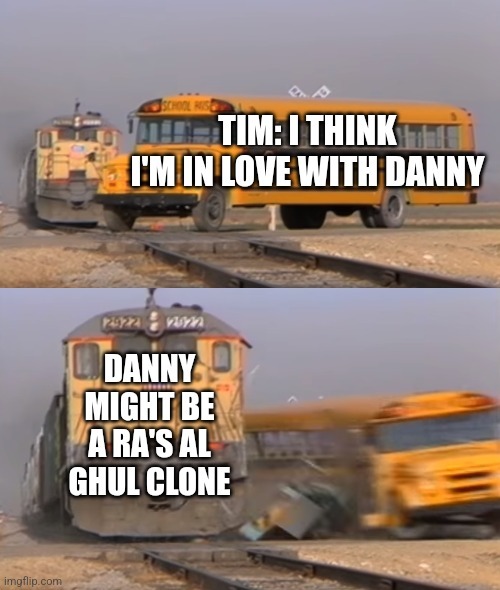
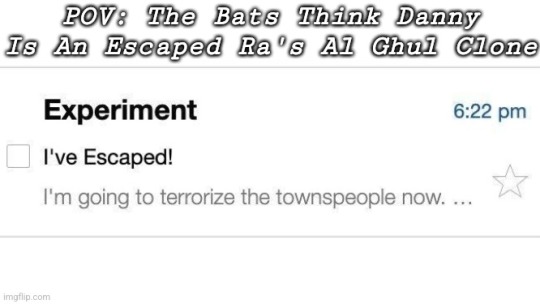
#captain's posts#this has been haunting me#the flash/any of the speedsters:*exist*#danny:*can feel the speedforce on them* i like your vibe funny man#basically danny is actually an alternate version of Ra's Al Ghul and gets chucked into the dc vesrse#because natural portals are bitches hijinks ensue#and while i do love batfam adopting danny i think its very funny for flash to just yoink him while the big bad bat isn't looking#i desperately need him and tim to be besties tho specifically before they find out danny is an alternate Ra's Al Ghul#danny:*sitting in a park and tinkering with some circuitry* oh hey flash :)#flash: hey kid! great news i might be adopting a kid soon!#danny: oh really? thats cool-#flash:*holding out adoption papers and doing his best puppy eyes* its you. sign here.#danny:*vague memory of clockwork complaining about speedster pops into his mind* hmmm#danny:*deciding to be a little shit cause what else do you do when you're almost a year into being stuck in an alternate dimension* >=)#danny: sure why not? soooo full name or what?#flash:*didn't expect to get this far* uh-#i also really like danny being clockworks apprentice/time line clean upper so danny just remembers cw bitchin about the speedsters#also cause im a sucker for tim x danny...#tim:*having a crisis cause the cute meta kid he befriended/has a crush on may or may not be a vlone of Ra's Al Ghul* aaaaasaaaaaaaasaaaaaaa#dick: you okay buddy?#tim:*aggressively points at the dna match of danny to Ra's Al Ghul on the bat computer* AAAAAAAAAAAAAA#dick: Oh-#dc x dp#dp x dc#dp x dc crossover#dp x dc prompt#dpxdc
3K notes
·
View notes
Text
i just think the physicality shown in 8x05 between buck, tommy & eddie was so interesting.
tommy hovers outside buck’s hospital room while eddie is already sitting inside talking to the doctor—tommy comes in but eddie stays. buck is the patient, tommy is the visitor (name tag and all), but eddie is simply there; a permanent fixture.
in buck’s loft, tommy sits at the table across from buck and eddie. tommy recoiled from buck when he first saw the boils, and even though eddie is grossed out by them too, he’s the one getting up in buck’s personal space to check them out.
at the hospital waiting for news on denny, tommy is sat right next to buck but is simultaneously excluded from buck’s personal bubble through the 118 group chat notification—which was specifically called out in the dialogue. eddie stares buck down while sucking on a ring pop which of course could mean nothing.
finally, at the cemetery, tommy is standing entirely separate to buck; not by his side the way cough buddie cough were in s6. the ending shot was the *perfect opportunity* to establish bucktommy as a serious relationship. buck could’ve taken tommy’s hand with the two of them walking into the distance together—instead, buck strides away without looking back while tommy jogs after him.
and that’s not even bringing up how there was quite literally zero explicitly romantic affection between buck and tommy the entire episode, even pre-boils (because hey after that fair enough). without those romantic cues, it becomes so much easier to draw comparisons between buddie and bucktommy (both physically and emotionally) and see how eddie is consistently occupying the role in buck’s life that tommy can’t even begin to try and take on.
#yk midterms stress is bad when it’s got me rambling on this app again#but HEYY here’s some meta i’ve been chewing on#buddie#buddie meta#evan buckley#eddie diaz#anti bucktommy
165 notes
·
View notes
Text
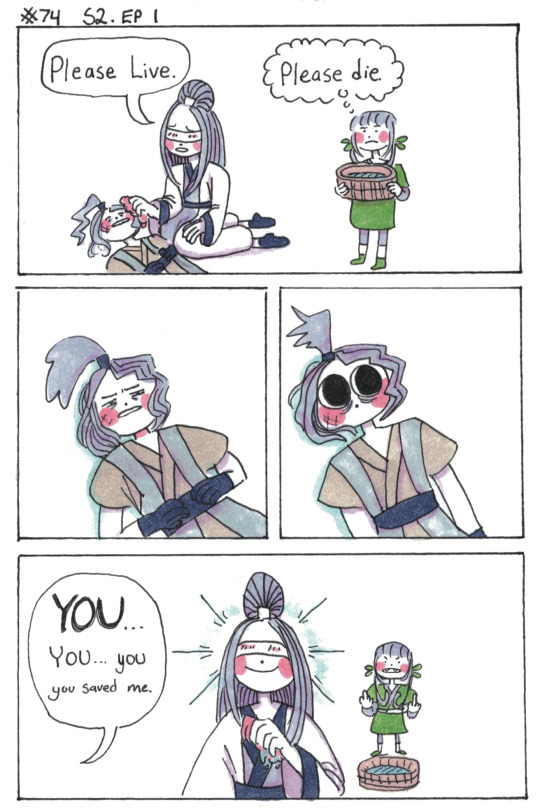
Hello Stranger. Whom I have never met.
[First] Prev <–-> Next
#poorly drawn mdzs#mdzs#xiao xingchen#xue yang#a-qing#Xue yang realizing the situation and changing up his mannerisms on the spot probably should not be as funny to me as it is#Everyone here is in a bad situation. XY and A-Qing are playing the long game of faking critical information#XXC is just vibing. I am calling him 'baby girl' in the most 'oh god we got to get you out of this house' tone#The situation at hand is the xxc took home a bobcat to nurse it back to health#thinking it would be just like a housecat. But a house cat would also eat your face advantageously. A bobcat wont wait for you to die#meta note: I've been drawing the last few comics in the same room as my buddy while they play hollow knight.#They were going through the royal waterways while I've been drawing. Fighting Flukes.#If you care to know about the auditory experience in the BG that underlies these last few comics.#if you know then you know. If you don't... then I wish I was you.#but I like to think thats what XY hears when he's passed out in his nightmares. As he deserves.
1K notes
·
View notes
Text
so if the bad kids do the classic, switch to defeat your doppleganger move that happens a lot when facing the rat grinders, I think this is how it should go down. (note this was written last week before ep 18, where they used a lot of their resources) This is a purely hypothetical party vs party combat
Ruben-Fabian or Adaine. Fabian with his eyepatch is immune to fear which a lot of college of whispers does really well, as a half-elf he gets wisdom saving throws on charm which is also the bard's bread and butter. He's a fast fighter bard with spellslots to use basically as smites. so he could really blast down Ruben before things start. Adiane as an elf is another good choice like fabian she has advantage against charm affects and while she is not immune to fear like fabian she has a better wisdom save than he does since she is proficient. I would put Fabian over her though mechanically, and he is also a fan of Ruben's so it would be funny to watch them fight
Ivy- Gorgug. He's not the best option, but he's probably the bad kids best counter to her. as a ranger and fighter, she can do a lot of damage to the others with her range, having to deal with a barbarian who can keep hitting you from range. attacking recklessly would negate a lot of the benefit of Shadowy dodge and as a barbarian he would be able to shrug off most of her ranged attacks. He probably has some artificer item that would let him create a light thing like the solar lasso so she wouldn't always be able to hide in the darkness. For the lesser affects of her arcane arrows and ranger abilities, Gorgug has pretty decent saves, and for the dangerous ones like Banishing Arrow, he can at least use flash of genius on himself to bolster those saves. The Ranger part is kind of lost on me, the spells seems decent but nothing that can really stop Gorgug since he's a barbarian, but could mess up someone else in the party. Ranger spells are decent, but he has a pretty strong counter and I can't see Ivy being higher than level 9 in ranger since it seems like fighter was her base class and it has to split somehow.
Oisin- Fig. As a lore bard/paladin/warlock I think it would be best for her to get into Oisin's face and smite the hell out of him. You can't counterspell a smite. As a wizard he is probably the squishiest member of his party so taking him out would be very important. Additionally, she has counterspell which could leave him in trouble in close range. With Shield, Oisin can have a decent ac so there's that, but he's still a wizard who rolled a d6 each level.
Kipperlily-Kristen. While it surprisingly works president versus president, it also works as a cleric with heavy armor. It's not great as a defense against a high level rogue, but it's better than most of her friends have. Not to mention Kristen can do aoe none dex spells that are good against rogues as they won't get evasion from them. it's not great to have your healer dealing with the parties rogue, but sometimes you don't really have another choice. Lots of dangerous cleric spells don't have a dex saving throw so it could be useful once Kristen can see her
Buddy- Adaine. Not a particularly important match up story wise, it has potential but nothing juicy. still a wizard like adaine wouldn't be the worst match against buddy, spell caster vs spell caster, arcane vs divine. Not to mention I think that Buddy doesn't have a lot of HP and probably isn't expecting a melee wizard like Adaine. Adaine can counterspell Buddy's spells while he can impose disadvantage as a light domain cleric, but Wizards don't just make attack rolls, they have saves. Also I think it would be a good contrast in their thoughts, Buddy believing he doesn't cast spells, that Helio/unnamed rage god works through him to cast spells vs Adaine who as a wizard has learned all of her spells. It's also a good contrast between the Bad Kids and the Rat grinders about the theme of this season, hard work vs taking the easy way out.
Mary-Ann - Riz. This is probably one of the worst match ups, no one wants to go up against a high level barbarian 1v1. This isnt' an anime where the fast sneaky person can just lure the big strong bad guy away and keep them distracted. It's dnd where Mary-Ann might just ignore any physical damage because she can at the start.
I think the key to dealing with Mary-Ann is to not fight her. The Bad girls can get around her barbarian resistances with their spells but will go down in a few hits. Fabian can't do enough damage even with all his attacks, Fandragor doesn't do anything about the damage type Fabian does I believe, it works like smites but just increases the Piercing Damage instead of dealing Radiant damage. Gorgug is another Barbarian, but as cool as his new subclass is, I wouldn't put it up against a full also high level barbarian 1v1. Which leaves Riz
However, I think he's the only one who could survive a few rounds with her, he can keep sneaking with his bonus action, disengage (unless she has sentinel), or misty stepping with the Sword of Shadows to get away from her and out of sight and while she will keep halving any damage he does from sneak attack, it's still a decent chuck that even a high level barbarian can't ignore forever. Leaving Riz who can do a decent amount of damage each turn with his sneak attack and not be close to her, he can also halve one of her three attacks. Riz can also do a lot of tricky stuff as an Arcane trickster, Mary-Ann might be immune to fear and charm affects, but she isn't immune to all illusions and enchantments. He could trick her and keep her busy with his spells, with magical ambush she would be rolling her saves with disadvantage. A smart player like Murph could do a lot with his spell list to a Barbarian.
Now obviously, like I said under Mary-Ann/Riz, dnd is not an anime/show/comic book/etc where you can just switch against your doppleganger and win. I think the Bad Kids would beat the Rat Grinders because they know their shit more and they are a party that genuinely cares for each other so their team work has to be better than the party of their dark mirrors who were literally handed xp to power level. That being said I do think the Bad Kids could take their counterpart in 1v1 (with the exception of Gorgug)
Also with the Preview of the next ep(19) the Bad Kids will have to deal with Jace, a high level Sorcerer, and Porter a legendary Barbarian/Paladin, who are definitely more dangerous than a bunch of high schoolers who never really had to fight another party.
Still this was just fun to think about. If you have any thoughts let me know. If you think of your own matchups that you want to discuss also let me know.
#fantasy high#fantasy high spoilers#fantasy high junior year#fantasy high junior year spoilers#fhjy#fhjy spoilers#long post#fantasy high meta#riz gukgak#kristen applebees#adaine abernant#fabian seacaster#fig faeth#gorgug thistlespring#kipperlilly copperkettle#oisin hakinvar#mary ann skuttle#buddy dawn#ivy embra#ruben hopclap#the bad kids#the rat grinders
97 notes
·
View notes
Text
Finished Last Twilight, and I'm not adding to the ableism discourse, because most things have already been said and with a lot of beautiful nuance that I agree with. But I do want to talk about how that ending arrived because of Aof Noppharnach's consistent symbolic commentary on the experience of living with HIV in much of his work, with an approach that's unique among all queer content. Imma skip Gay OK Bangkok since its not even a metaphor there, but I'll explain my rationale for the others, and we can just appreciate the foundation Gay OK Bangkok lays for us to think about the rest of his stuff.
The motif of life-saving medical intervention comes up in all but one of the works he takes screenwriting credit on. He's Coming To Me: P'Med dies originally because of a lack of medical intervention. 1000 Stars: Tian gets a heart transplant. Moonlight Chicken: this one's more subtle, but the whole series is explicitly established in the context of reopening following the COVID pandemic, and Wen will later say to Jim, "we are survivors." It was this line upon rewatch that made me start considering how thorough this theme is. Survivors of what? The meaning is three-fold: hard lessons in love, COVID, and, for gay men of their age, the HIV epidemic. The hope of medical intervention for Day's condition takes on a secondary meaning, with this trend in mind, even if the mixed disability politics between visual impairment and being HIV positive really fails.
His comparisons are more intricate though. Pills and daily regimens are a consistent motif. Day has his daily eye-drops, Tian his pills (which are presumably immune-suppressants to help accept the transplant but I'm not going to Viki right now and watching every ep to find out so someone feel free to correct me). 'But people take medicine for lots of things,' you say. 'Just because its gay doesn't mean its an HIV metaphor!' You have a fair point! But here's where Aof gets real fun and sneaky. P'Med dies from lack of pills the same year Torfun, whose heart will save Tian's life, is born, 1997. I'm mentioned once before 1997 as important for the class-conscious Aof because of the Asian financial crisis that Thailand set off that year. However, 1997 is also important because its the year HAART, or Highly Active Anti-Retroviral Therapy was first used in Thailand (it had hit the market only one year earlier). HAART, a multi-drug regimen, boosted someone's life-expectancy with HIV up by 15 years, and its side-effects were significantly milder than previous approaches. The medical conditions of P'Med and Torfun's heart point us directly to HAART, and what it could offer.
Now we're moving out of the medical and into the experiential connections because, while Dark Blue Kiss is the only work Aof chose to take credit for screen-writing without incorporating medical references, it is by far the most dense with references to the issue of concealment. Its in the narrative as people closet identities and hide relationships, yes, but its in SO much of the visuals, too, most obviously the Pete & Kao mug hidden inside its coozie. It's easy to see the surface story about gay visibility and the closet, but there's a more specific subtext here about the associated condition that intensified the stigma of being gay and how that impacts your sense of self. Bad Buddy explores this issue less, but even in the BL Bubble, its haunted by the stigma of homophobia--it just shuffles it over onto rivalry so the audience can experience it without reproducing it.
However, the grief and shame of surviving when others haven't haunts Aof's other works much more intensely. Jim and Tian both are hung up on guilt for someone's death that they did not actually cause, continuing to pursue the goals for those that passed rather than their own. Then, there's Thun and P'Med, which is the best allegory for living and dating with HIV, bar none. It goes into the feelings of stigma and the limits of physical intimacy with partners that living with HIV caused, especially prior to Truvada's introduction in 2004. Even then, the show depicts how a HIV negative partner maintains the choice to participate in their own regimens, as Thun's desires for physical intimacy with P'Med manage their relationship and never the other way around.
This sense of required separation and gay identities that are less sex-focused also play into oft-maligned motifs in Aof's work. He's talked explicitly about people's criticisms of the limited physical intimacy in his earlier works that led to the more prominent stuff in Bad Buddy, but I hope given the above context, we can appreciate why physical intimacy is less of a priority than other kinds (and I'd add that 1000 Stars, which got the most sh*t about it, is actually one of the most erotically-charged BLs out there because of it's restraint). Then, you have the finales where characters separate for periods of time, and while I don't see this as explicitly tied to HIV experiences (Aof is literally following the book of romcom beats there, even if everyone whines about it), I can't help but appreciate a tangential connection to loving beyond time and distance that was required for those who lived with or lost loved ones to HIV.
I would've loved to see a version of Last Twilight that didn't absolutely bungle its metaphor, because it had every element to be something great (except, I'm sorry to the fans, lead actors with the necessary queer romantic chemistry). Watching the last episode, when the show seemed to finally rediscover plot and pacing, all the other pieces that had been drowned out by the disability conversation peeked their heads out, and I saw what the show wanted to be. The topics related to living with HIV of stigma, survivor's guilt, and assistive technologies: they were all right there, not just for Day but for everyone, if only they had been given the proper time to marinate to develop more complexity. It's the rare instance of a show where I'll choose to spend time imagining what could have been rather than obsessing over what was or just moving on. Even a misstep from Aof, like this, is overflowing with so many more layers than most series. The failures of Last Twilight, in relationship to his other works, even let you see how much food for thought he's providing.
#1000 stars#aof noppharnach#last twilight#he's coming to me meta#hctm#dark blue kiss#bad buddy#moonlight chicken#thank goodness we have heart from mlc where Aof doesn't try to fix him b/c deafness ESPECIALLY is a culture that's not tryna be 'saved'#also for anyone wondering i always say P'Med cuz I can't ever stop thinking of Ohm shouting it on the rooftop
48 notes
·
View notes
Text
so funny how gale pulls himself out of his suicidal slump purely by finding something new to unhealthily fixate on. just complete 180 immediate full steam ahead to the next unhinged idea. he sees that crown and goes Ok im not mentally ill anymore! 🥰 (is obviously still mentally ill. in a new and exciting way)
like people will complain about the lack of emotional resolution to the plotline and while i get it, to me that is a feature not a bug. my mans is not Emotionally Processing a fucking thing. this is the guy who had a year to brood in his tower and learned nothing. zero personal insights. act 3 gale is manically distracting himself from dealing with anything all whilst backsliding into hubris bc he is unable to comprehend a middle ground between Gods Specialest Boy and Gods Wretchedest Fool. i love him so much
#cannot cope with the thought of being Just Some Guy. is the most Just Some Guy of the entire main cast#gale#bg3#gale dekarios#baldur's gate 3#aphelion.txt#suicide mention#meta#i. guess??#honestly fucking relatable too#not the part about being gods specialest guy#but the part about being in bad mental health and latching onto something#with insane intensity so you dont have to think abt any of it#it feels very realistic tbh but also cackling at him bc#oh buddy. those feelings are going to Get You eventually
88 notes
·
View notes
Text
About Maddie's reaction to ~the incident
One of the things I think is important to point out, because I haven't seen or read anyone talking about it, is Maddie's reaction when Buck told her the truth about the basketball incident. When Buck first arrived, she was all smiles, probably happy to have Buck there. Then she asked about how Eddie was doing and Buck said he hadn't talked to him because what happened on the basketball court was not an accident.

Buck confessed that he might have meant to hurt Eddie because he was pissed, felt left out, and he guessed he was trying to get Eddie's attention (I’m not gonna go Buddie here, but he legit literally said exactly this which !!!).

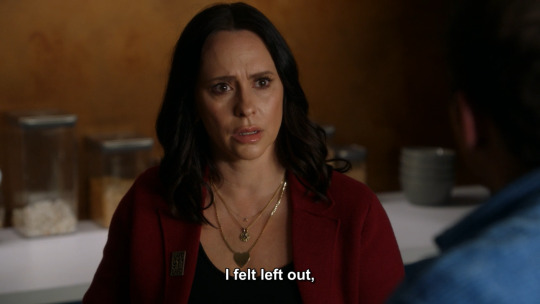
Her face started to morph, the change in her whole demeanor, the horror of it all... she was really really mad. I don't think JLH got the proper credit for it. It's truly remarkable, her face spoke volumes about everything that was going through her head at the moment. You could see Maddie thinking about her past, about Doug, about how he hurt her and the terrible ways in which he justified that behavior as she was telling Buck that you do not hurt people to get their attention and not to do it again.



The episode didn't make that connection explicit (they had her babbling about Sarahs instead, more on that in the last paragraph), and I KNOW that if roles were reversed, part of the fandom would've lost their mind, since they love to portray Eddie as violent and abusive towards Buck when there's nothing in canon to back that up, quite the opposite as of this episode actually. Since Eddie was the one who got hurt, it was no big deal, it was pretty much forgotten immediately after. I thought it was a huge deal, I thought tptb didn't really address how problematic that was. I thought the only one who reflected the gravity of the situation was Jen, maybe thanks to her character's past.
BTW, I don't think it's in character for Buck to do this, I think he does know better, and he really isn't and hasn't ever been the type to resort to violence. Having said that, that's what tptb decided to do on screen, maybe as a way to show he was struggling with his identity... But that’s kinda terrible, like, he’s confused at this point about his feelings so his first instinct is to harm his friend out of jealousy? Also, we didn't get to see anything else on the matter after. It was such an odd choice, tbh, cause yes, Buck and Eddie probably talked about it for a second and then made up offscreen, but to have a character be violent towards his friend just to push a storyline forward, a storyline about bisexuality of all things, disregarding everything about said character and then not acknowledging it... Some very bad choices were made. Once again, I think tptb prioritized moving the plot forward over making sense and that's just something I truly hate with my whole heart.
Characters cannot have their choices and actions dictated by the plot or, at least, it can't feel that way to the audience. That's just bad writing through and through. Tptb did this a lot this season, and I understand that time was pressing because of the strike and all, but they need to do better. They are professionals getting paid to do a job, the least they can do is actually make it all make sense for the fans and stay away from toxic portrayals of LGBTQ+ characters (Hen cheating, anyone?).
The whole story about the Sarahs was really kinda ridiculous, honestly, I think they just had to give Jen more to do but a follow up without it would've been much better. Of course, seeing as their intention was to completely ignore the gravity of the situation, they simply couldn't mention Doug at all cause that would've required Buck and Eddie discuss this seriously instead of completely forgetting about it.
#911 ABC#911#Buddie#Buck and Eddie#Eddie Diaz#Evan Buckley#Jennifer Love Hewitt#Maddie Buckley#Maddie Han#911 Meta#Buddie Meta#realchemistry#anyways#I had to get this off my chest cause it's been running around my head forever#and the more I thought about it the worst it got#tptb are so messy and they get away with it because most people are just casual viewers#but... like... then this is how bad takes are perpetuated
45 notes
·
View notes
Text
Bad Buddy ‼️
Guys, Bad Buddy is THE show ever ‼️ If y’all like queer/bl Thai dramas with the enemies to lovers, rivals to lovers, miscommunication, unrequited love, forbidden love, rooftop scene, semi-forced proximity, injury, whatever you name it trope, then WATCH. THIS. SHOW. IT HAS IT ALL AND IT’S EXECUTED PERFECTLY. I CAN’T TELL Y’ALL HOW MANY TIMES I’VE SCREAMED WHILE WATCHING THIS SHOW. IT’S ME AND MY POOKIE WOOKIE PUPPY BEARS’ PRIDE AND JOY—- PLEASE WATCH IT. 😭♥️

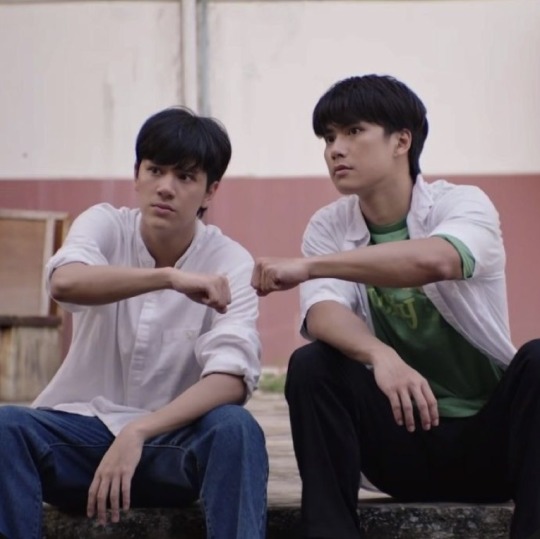
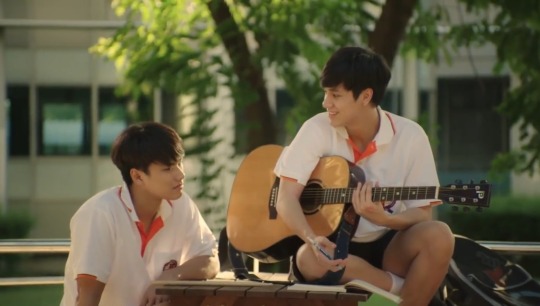
#bad buddy#bad buddy the series#bad buddy fanart#bad buddy series#bad buddy spoilers#bad buddy brain rot#bad buddy meta#thai bl#thai drama#thai series#thai actors
106 notes
·
View notes
Text
Pran always opens his eyes first when they kiss. Pat, on the other hand, usually keeps his eyes closed like he wants to savor all the lingering tastes on his lips before he lets his other senses distract him. Lips still slightly parted, tongue darting out just a little, every kiss seems to make Pat sated, and Pran doesn’t want to lose a chance to commit every one of these moments of Pat into his memory.
Pran still gets a rush of headiness every time he sees Pat this way, and sometimes his thoughts would go back to their first kisses on the rooftop, how it felt like a fantasy, never to happen again.
It’s real, though, Pat’s kissed swollen lips and satisfied smile, unmistakably smitten face. Those were his now. All Pran’s.
He needs to remind himself of this reality, still unbelievable sometimes no matter how long they’ve been together. Because Pran has never really felt sated. Even as the awe and wonder that is Pat keeps filling him up, gratuitously so, his bottomless hunger from years of yearning for this man somehow lingers, refusing to be satiated.
Pran thinks he’s probably a bit wrong in the head when it comes to Pat, because Pat had always been wrong for him, forbidden, impossible.
So he opens his eyes first after they kiss, savors Pat savoring Pran’s taste on his lips, reminding himself again and again that Pat is his now, and hopes that one day this seemingly unending yearning will finally, finally be satisfied.
(As it is, though, he wouldn’t bet on it, but Pran guesses that’s okay, too.)
#patpran#bad buddy#bad buddy the series#badbuddy#because we have to keep patpran alive#at all costs#patpran meta#bad buddy meta#patpran fic#at this point i’m a ghost that haunts the rooftop#ohmnanon#PatPran ficlet#bbs fic#bad buddy fic#my writing#i just write what i want to read#in tandem
31 notes
·
View notes
Text
a completely definitive ranking of pran's sweaters in bad buddy
as we all know our parakul siridechawat likes a good sweater, and they are (almost) all excellent. but some are more excellent than others, so: my completely scientific ranking
(if you've seen this before elsewhere shhhhh no you haven't)


6. leaving for singapore sweater (4/10) - i'm sorry pran i think this ugly - points mainly because the scene is cute - the patterns clash? or the colors? or both? idk idk


5. singapore office sweater (5/10) - i feel neutral about this - only shows up briefly - sweaters with things written on them = not my thing - also max is there so

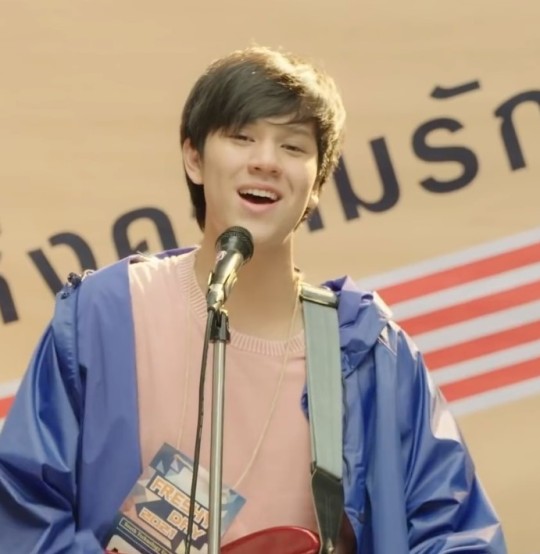
4. freshy day music festival sweater (8/10) - i like this sweater - it looks so soft - points off for the raincoat - what even was moi’s costume concept - but points back on for singing the song you wrote with your crush about your crush back to your crush
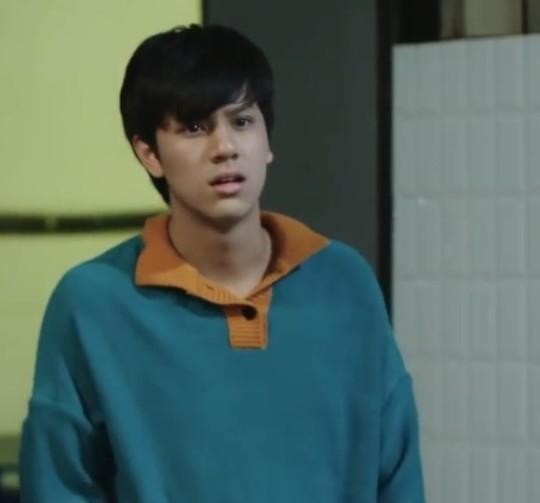

3. manidi sweater (9/10) - listen i am a sucker for a teal + burnt orange combo - love that it's collared - also you can't see it in these pics but sweaterpaws - no wonder pat’s brain went a little fuzzy
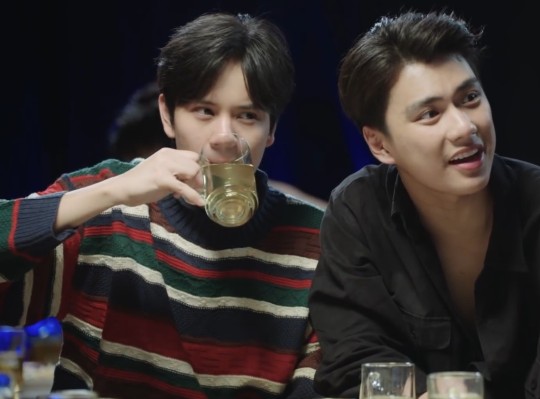

2. behind the scenes bar sweater (10/10) - can’t explain why it’s good it just is - the colors, the stripes of different widths - doesn’t hurt that he’s glowing in it i guess - get yourself a lover out of your university's long-held faculty feud


1. kwan & riam audition sweater (10000/10) - the platonic ideal of a pran sweater - it’s cozy it’s pretty it’s cable-knitted - asymmetrical but in a cool way - look out knives out sweater this one is coming for you
#very important bad buddy analysis#yes i will be taking comments#but i WILL fight you if i disagree#bad buddy#parakul siridechawat#ranking things because i can#pran's sweaters are very important#bad buddy shitposts#bad buddy meta
195 notes
·
View notes
Text
Pat's Growth- from troublemaker to walking green flag
Pat Napat Jindapat is by far one of the greenest flags i've ever seen in shows. Especially asian shows with men. But for quite a while i was wondering why Pat's character in the first episode gave very different vibes from the one he turned out to be eventually.

Of course he liked to help people but Pat in episode 1 is mostly picking fights for no reason and just exuding aggressive {alpha} male-ness (derogatory) and i just couldnt really put a finger on exactly how his transformation happened. How convincing it was that this was the same guy.

Pat and icy?? I just had to replay that part when i rewatched the episode for the second time cos the pat i loved was the very opposite of icy.
That's when I was reminded of Pat from high school. The younger, happy go lucky version of himself who had few disappointments in life being the spoilt golden son in a clearly patriarchal household. Despite being spoilt though, while he was still mischievous he wasn't really picking fights for no reason. He had left that in his childhood as had Pran.

High school Pat was thus a glimpse of the man he could turn into, the man he would turn into. That was until Pran moved away and Pat was suddenly all alone. He was still the popular guy, he still had people around, his family was there still hurrahing every small and big victory spoiling him left and right, he didn't have to move away, he no longer had to compare GPA's he was finally at peace, except that the peace came at the price of a loneliness so depressing and soul crushing it literally sucked the very Pat out of Pat.
The loneliness borne out of Pran's absence allowed a multitude of thoughts to fester in his mind. Idle mind is devil's workshop and whatnot. He began to be more man. Be more louder. Be so in your face nobody could ignore his existence. Loud enough that maybe it could drown out the deafening silence of his loneliness. And that's the Pat we meet in episode 1. The one who picks fights for the flimsiest of reasons and just can't control himself in one. And then? And then he sees Pran.

Memories flood back. Of times gone by. Childhood games and Guitar picks and writing songs.
Except it doesn't. Pat doesn't allow them to come back. There is no instant change in him. He tries to continue his old ways. Tries to fight.
Tries to keep it loud and all man. But alas how longer could he have stalled the change. How longer could he have pushed away the memories. Pran was back. His competing dimpled and fierce buddy-enemy was back. More importantly at that point the Pat who he was when Pran left was steadily knocking at the door to be let out. And Pat could choose to suppress him again. Or he could choose to be him again.
With Pa's advice and fate intervening and putting them in next door apartments, things begin to change. Pat suddenly finds himself wanting to be around Pran all the time. Trying to make up for all the lost time. For all the loneliness. And that's when we see Pat meeting his younger version.
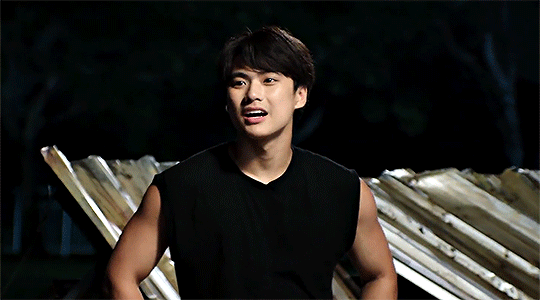
A softer, kinder, more safe space puppy human than macho fighter.

Still Pat, but a better one. One who looked for solutions than to create problems. One who wanted to be friends more than fight. The one who wanted to and now once again suddenly got to be around Pran.
And so he does. He sheds his macho skin like that, he becomes the Pat that Pran fell in love with in the first place.

He becomes the Pat that Pran continues to fall deeper in love with.

He becomes the Pat that sacrifices his win for his boyfriend, sacrifices his need to be loud if that's what Pran wanted, the one that is lifted up by a simple phone call or the smallest note, the one who still fights but apologizes soon after.

The one who wakes up early to make breakfast for his boyfriend, the one who reaches inexplicable levels of happiness just by sniffing a shirt.

The one that ends up on that rooftop with Pran. Not the iconic rooftop kiss one. Of course that. But eventually the one on the house they will end up sharing together.

And thats how i believe Pat became the Pat we loved in episode 12. He was always in him. And when he longer suppressed that part of him, when Pran's return heralded his own revival, that was when that Pat could come out and breathe the fresh air and become the person he was always meant to be. The one with whom just being in his presence makes Pran feel like freedom was his. The one who both Pran and all of us fell in love with.

I made a much longer version of this but for Pran, do check it out if you'd like here
230 notes
·
View notes
Text
i know I’m not alone in this but my favorite thing mhok did this episode, out of all the sweet things he did, was urge day out of his comfort zone to set a plan with august. it spoke volumes about his character and about his relationship with day. it was just such a refreshing turn of events (that led to a cute practice date sequence)
this ep set up mhokday v. augustday in a way I can really only call “juicy” lmao. day makes excuses for and takes on the onus of talking august down from his flighty and flaky tendencies; mhok is day’s anchor, in a myriad of ways, and when he wasn’t there for day during that scene in the markets, it was of course in no way positioned as day’s responsibility. day had to strive to earn august’s acceptance; mhok’s acceptance has been unconditional even if it took some trial and error for him to understand day (I think their relationship is built on a deepening understanding of each other, fostering this two-way acceptance). day and august were assigned to each other; day chose mhok and mhok chose day. august surreptitiously walks away from day’s feelings; mhok shoulders them despite his own.
we’re shown right off the bat in ep5 that august and day’s relationship strikes something like jealousy in mhok. but this is a grown ass man with a caretaking job. even as he blurs the line between caretaker and suitor he remembers his place—his place as day’s friend and phi even more than as his caretaker imo. above all else he wants to help day push past self-isolating tendencies (look at all the friends who love day! he’s not meant to be holed up in his room!)(and I mean, this is personal for him! not just as someone with feelings for day, but as someone who lived through the suicide of his sister and as someone who had been in jail before).
and the way he reacts to day’s confession of feelings for august—we see that day is not the only heartbroken one here, but mhok doesn’t let day in on that. there are more than a few things he doesn’t let day in on, in this scene lol. he didn’t even divulge the full story of rung’s tragedy (just as day only hinted at what happened between him and night). mhok is just fully present for day as day deals with his own heartbreak. whereas in august and day’s relationship as badminton partners, august’s feelings formed the center of their relationship, and he often left day scrambling just to appease him.
there’s probably some comparison to be made between mhok stepping in and setting up dinner plans for august and day, and august insisting that he will never have another badminton partner if it’s not day. it’s like love v. possessiveness. mhok has this maturity that is really compelling, makes sense with his character, and again is just soooo refreshing
mhok has made a few self-deprecating comments about lacking tenderness, a hang-up informed by his past and by his sister’s suicide, but damn if this man isn’t the paragon of devotion idk what he is. and because of all this, because we’re seeing mhok place his feelings second to caring for day, i am of course looking forward to seeing mhok’s feelings prioritized alongside day’s and his insecurities addressed as the series progresses. in conclusion, what a mensch
#im also looking forward to his smoker lung ass doing a run with day lol#last twilight#anyway u can once again find me in Aof’s walls#i feel like I’m really not a meta writer unless it’s bad buddy bullshit and ESPECIALLY before a series has fully aired#but damn this show got me#i write this as a jealousy and possessiveness lover btw i think those are juicy too#and i LOVE absolutely everything august is bringing#but everything mhok does is in line with what we have learned about him and it’s satisfying#to see stellar character work like this
97 notes
·
View notes
Text
Pain, Trust, and Separation in Some Asian Dramas (The Second Post In a Series of Utterly Un-scholastic, Highly Personal Big Meta)......
AKA, Turtles Catches Up With Old GMMTV: The Bad Buddy Rewatch Edition, Part 2 -- How Themes of Pain, Trust, and Separation Create Structure and Narrative in Bad Buddy and Other Asian BLs
[The following is a preamble I use for my Old GMMTV Challenge posts, here we go! What’s going on here? After joining Tumblr and discovering Thai BLs through KinnPorsche in 2022, I began watching GMMTV’s new offerings -- and realized that I had a lot of history to catch up on, to appreciate the more recent works that I was delving into. From tropes to BL frameworks, what we’re watching now hails from somewhere, and I’m learning about Thai BL's history through what I’m calling the Old GMMTV Challenge (OGMMTVC). Starting with recommendations from @absolutebl on their post regarding how GMMTV is correcting for its mistakes with its shows today, I’ve made an expansive list to get me through a condensed history of essential/classic/significant Thai BLs produced by GMMTV and many other BL studios. My watchlist, pasted below, lists what I’ve watched and what’s upcoming, along with the reviews I’ve written so far.Today, I offer the second of four posts on Bad Buddy, and the second in a Big Meta series on pain in some Asian dramas, including QLs and/or het romances. I'll look today at how ideas of pain in love, trust in love, and separation of partners/family members creates narrative drive in Bad Buddy and other Asian BLs. THIS IS A LONG POST, caveat emptor.]
Links to the BBS OGMMTVC Meta Series are here: part 1, part 2, part 3a, part 3b, and part 4
Well, after a lot of titles and a chewy preamble (thank you for getting through that, y'all!), I'm here to say that I'm combining my two ongoing meta series into one big ol' post here that I've been dying to write for months. In the course of my watching the shows on the Thailand-based Old GMMTV Challenge watchlist, as well as watching shows from my BL gateway of Japan, I've noticed that the themes of pain and trust in love, along with voluntary or involuntary separation, have been used to create dramatic and narrative structure within Asian dramatic stories to many emotional effects.
I'm celebrating the incredible Thai BL drama that is Bad Buddy in my OGMMTVC series at the moment, and within my Big Meta series on pain in Asian dramas, I examine how themes of pain so very often harken back to artistic, and even traditional, viewpoints of how pain, suffering, and melancholy are natural cultural assumptions within many collectivist Asian societies. In my first Big Meta on pain and suffering in Asian dramas, I wrote that "accepting pain and suffering is a part of the life we decide to live, from an Asian cultural perspective." Suffering is a naturally assumed part of life, a very distinct and identified part of a Buddhist's lived life, and even outside of Buddhism, accepting and living with difficulties of all kinds -- wealth disparities, the struggle for a good education and/or a successful career, the struggle to conform to collectivist familial and/or social expectations, etc. -- are extremely common themes that are unwound on in Asian lives on a minute-to-minute basis. The idea that an Asian must live with pain is often a root of intergenerational trauma, passed along from generation to generation of Asian children-to-adults. The social mores by which Asians are raised and live, to assume what Westerners might call a lack of unconditional parental love and affection, are certainly in part rooted in an assumption that living with pain and without the, say, luxury of turning over one's emotions at any given moment, are an automatic given.
As I've plodded through the OGMMTVC watchlist, I noticed very often that separation of people -- whether those people are lovers, children/parents, or simply just adults within a group -- is often a major narrative turning point in the course of a dramatized relationship. Of course it would be; it's a common trope within the romance genre, for instance.
But I find the separation of people otherwise connected to each other -- and the assumed pain of that separation, and the trust that people may have to return to each other -- particularly fascinating within the realm of Asian dramas, for reasons relating to the assumption of pain and suffering in one's life within Asian cultures that I mentioned above. In other words, the pain of separation, and the trust that one might have that one person will come back to another person -- are givens within the scope of Asian life.
In the following dramas, I note that separation is either a central storytelling point, or is a central focus of side characters:
1) The Thai filmmaker, Aof Noppharnach, has explored separation of people/lovers in many of his shows, including Still 2gether, A Tale of Thousand Stars (in multiple forms), and in Bad Buddy (also in multiple forms, romantic and/or familial).
2) Also from Thailand, Until We Meet Again and I Promised You The Moon are two non-GMMTV dramas in which separation of lovers plays an important concluding narrative role.
3) From Japan, the movie version of Cherry Magic: 30 Years of Virginity Can Make You a Wizard?! captures an important central narrative of separation that leads the franchise's two protagonists, Adachi and Kurosawa, to explore depth in honesty and intimacy that they may not have otherwise achieved in their everyday lives.
The painful separation that occurs in Aof Noppharnach's shows is most often related to the outside forces of life as it needs to be lived -- very often economically -- within or external to Thailand. In Bad Buddy, Pran leaves for Singapore for two years. I'm going to unwind much more on Pran leaving for Singapore in the final installment of my Bad Buddy OGMMTVC meta series, particularly by way of how he can do it, emotionally. But I want to offer a quick note about Pran's departure that the show gives a hint to (despite the pain that we feel in our hearts for Pat's loneliness from Pran, as depicted so beautifully by Ohm Pawat and his silent and longing existence as Pat in the first half of the Bad Buddy series finale). The BBS finale has Pran stating that he'll only be away for two years, and that the pay and the opportunity for an excellent architecture job were better in Singapore. In conversation with the fabulous Thai blogger, @recentadultburnout, RAB mentioned that this is a common occurrence among young Thais -- to move overseas for better job opportunities.
In spite of my heart breaking a bit for Pran being away from Pat when I first learned about his leaving for Singapore -- when RAB put Pran's departure in that context, I had to slap my cheek a bit. Because! I'm a child of Asian immigrants. Separation from family for better economic opportunities is a HUGE part of our paradigm of life between continents. As my Asia-based uncle, my mother's brother, once put it, in regards to my mother: "one of the children in our families always had to move away." For my mother's family, it was my mom who shipped off. Besides individuals seeking better economic opportunities for themselves, the economies of many Asian countries are dependent on the reception of remittances from overseas family members sending money back to their home countries, as my mom did for years; the Philippines is particularly notable for having a nearly 9% contribution from overseas remittances to its gross domestic product. In other words? The separation of loved ones is literally built into the financial frameworks of many Asian nations.
The separation of children or partners to overseas locales for the sake of better salaries and/or opportunities is simply a more assumed part of the cultural paradigm, I'd argue, in Asia than in the West. Family separations for jobs are extremely common in Asia; in the West, I'm not sure they are as assumed, especially for extensive separations, as the value placed on keeping a family unit together for cultural or spiritual reasons seems to be more a part of the Western fabric of life (despite our high rate of divorce).
We see an even more permanent economic separation happen in Still 2gether between two side characters -- Type, played by Toptap Jirakit, who is Tine's (Win Metawin) brother, and Man (Mike Chinnarat), who is Sarawat's (Bright Vachiwarit) friend. Man chased after Type during the first 2gether season; in Still 2gether, they're navigating their committed relationship, as Type contemplates, then accepts, a permanent job offer in Phuket, hours away from their home base in Bangkok.
As @lurkingshan put it, I might be the only person on the planet contemplating Type's and Man's relationship (lmao, it do be true), but I found Type's last conversation with Man, on the beach, to be particularly direct and moving for someone who has no immediate plans to move back to the side of the person he's dating.
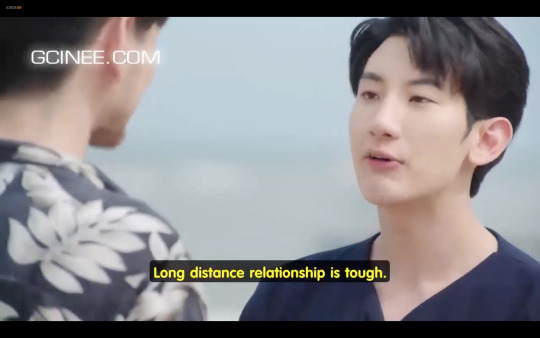
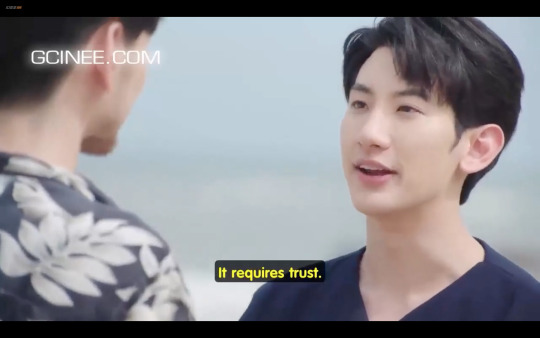
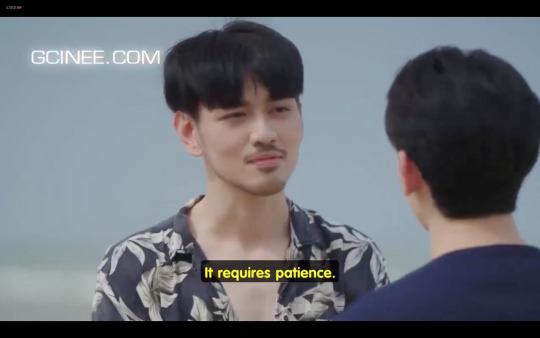
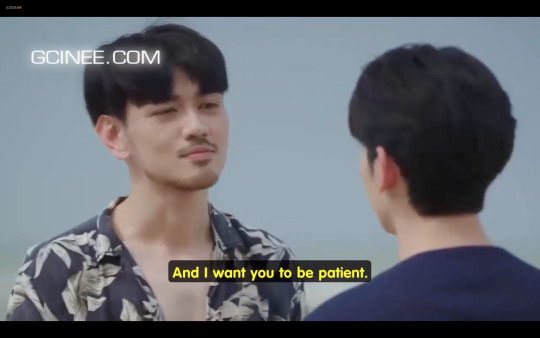

I think about this scene against the structure of the short series that is Still 2gether, which is centered around the protagonists of Sarawat and Tine being temporarily separated as they prepare to compete in a university-wide tournament. Sarawat has the most lovely contemplation on love during this separation, and even Aof Noppharnach himself admits that the glance that Sarawat and Tine give to each other as they pass each other in the lead-up to the ultimate tournament is his favorite scene he's ever filmed (!!!) (and that scene is sooooo reminiscent of Pran's and Pat's pinky-hold after their public "break-up").
In other words: Still 2gether is ALL about separation, and contemplating the strength of love relationships in the face of those separations. While Sarawat and Tine will get back together, after that tournament -- Type and Man are separated for the foreseeable future. There is no end indicated to the patience that Type wants from Man. The conversation is just, THERE, and hanging -- there's an acknowledgment that long-distance relationships are tough, but Type isn't offering to quit his job and move back to Bangkok. Instead, Type and Man are left to accept the reality that there is no end in sight to their separation.
And I think this was incredibly bold of Aof Noppharnach to include in a GMMTV BL that otherwise ended happily for Tine and Sarawat, the main protagonists. What I admire about Aof's works are these sly inclusions of open-ended, sometimes melancholy non-resolutions, either for his main or his support characters, that leave us as viewers often slightly unsatisfied or unfulfilled. He did this in particular with the character of Aof in Gay OK Bangkok, a web series that he screenwrote in 2016; and many might say that Pran being away in Singapore is also not the most satisfying of endings for our beloved PatPran in Bad Buddy. To me, these decisions to do this artistically are just incredibly reminiscent, again, of the kind of pain that we as Asians have been culturally attuned to accept, for the sake of economics, and/or for the sake of the betterment of our loved ones.
Besides economic separations in Aof Noppharnach's works, we also have separations related to family demands and desires. In A Tale of Thousand Stars and Our Skyy 2 x A Tale of Thousand Stars, we see Tian leaving Phupha's side for two years to study for a graduate degree at Tian's mom's insistence; and we see Phupha refusing to join Tian, after Tian has graduated and moved back to Pha Pun Dao, on trips Tian takes back to Bangkok to celebrate his birthday with his parents.
When I rewatched ATOTS earlier this year, I noted that both Phupha and Tian were remarkably bad communicators throughout the original series -- and I posited that, in large part, their terrible communication was borne out by way of the both of them being raised in traditionally masculine Asian households that seemed to not allow for leeway regarding emotional revelations. BOTH Phupha and Tian were expected and intended to follow in the footsteps and demands of their family members. To the end of the ATOTS storyline in Our Skyy 2, Phupha brings up his parents -- and he hears what he has been wanting to confirm from Tian's parents, in their desire to have Phupha take care of Tian for the rest of their lives.
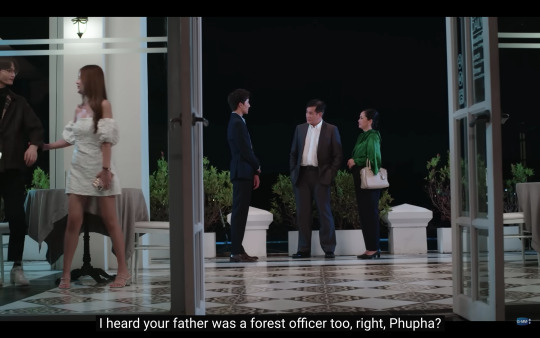

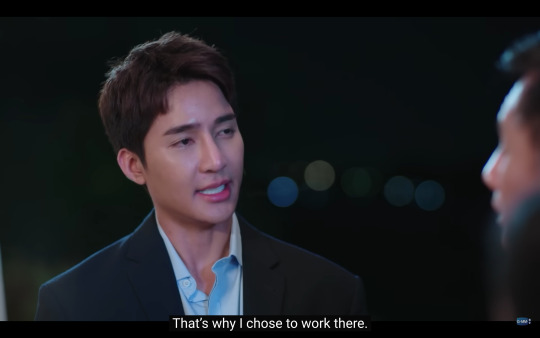
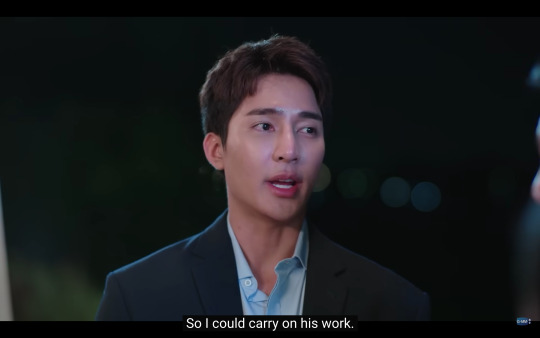
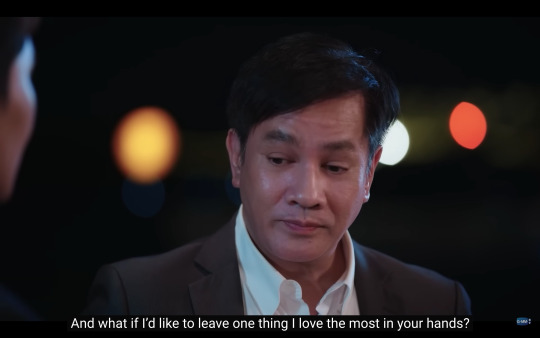
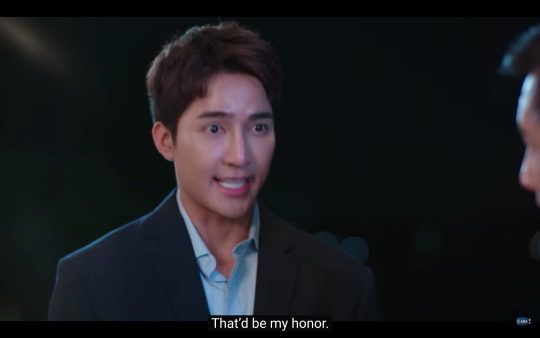
Phupha in particular needed to have multiple gateways opened to him, vis à vis Tian's family, in order to properly and openly confirm his permanent love and commitment to Tian. If Phupha didn't have that? He was willing to be separated from Tian, either temporarily, or at length. Phupha needed a kind of culturally accepting door opened to him -- as a man raised in what we assume to be a rural and traditional environment that may very well have not allowed for a gay man to live openly and honestly. Phupha indeed follows in his father's footsteps, to the extent of never leaving Pha Pun Dao, and demanded that he have Tian's family's approval before making the final commitment to Tian to love Tian forever.
I find the cultural nuances of nuclear family separation, or separation encouraged by nuclear family, to be particularly heartbreaking in many of Aof Noppharnach's works. We know that Jim and Jam, brother and sister in Moonlight Chicken, ran away from their Isan hometown as youths to find their lives in Pattaya, where we meet them in the context of that show. But separation either from nuclear family, or more impactfully, done by nuclear family, is most evident in Bad Buddy.
Besides Pran voluntarily leaving for Singapore, we know that Pran has been involuntarily separated from Pat before -- when Pran was transferred to a boarding school in 10th grade by his mother, Dissaya. Before that transfer, Pran and Pat were technically "separated" by their parents in so far as they were not supposed to become friends -- all while competing heavily against each other in every category of life.
That boarding school transfer? That wasn't just separating Pran from Pat. What I found remarkable about that separation during my recent BBS rewatches is that Dissaya HERSELF chose to be physically separated from her own son, for the sake of her rivalry with Pat's father, Ming.
I'm thinking about this particularly from the words she used with Pran as they sat at breakfast together before Pran started his second year at university, when Dissaya said that Pran could date anyone, men or women, as long as he "didn't date [the next door kid]."
My interpretation of that perspective is that Dissaya did not want Pran to relieve the heartbreak that she herself experienced when she was close with Ming in her teenage years.
In other words: she chose to send her son away in the face of her ongoing, lifelong fear that Ming and his family would once again wreak havoc on her and her clan.
In the continuation of the intergenerational trauma wrought upon Pat and Pran by their parents -- as a mother myself, this seems to be particularly egregious. Dissaya would have rather had her son AWAY FROM HER, than to contemplate her son even being WITHIN physical proximity to Pat in the context of her hatred of Pat's father, Ming, and the fear that she had that the Jindapats would negatively influence the Siridechawats again.
(The wonderful @telomeke reminded me, in conversation on this topic, that the first question Dissaya asks Pran, after learning about the first faculty fight in episode 1 when Pran re-encounters Pat for the very first time, was, "Did he hurt you, Pran?" Dissaya cannot bear to allow the Jindapats to hurt her son, or her family, ever again.)
I wrote in my first Big Meta on pain and suffering that Asian parenting expectations and mores are far more conditional than they are in the West, as parenting mores in the West are centered around unquestioned and unconditional love from parents to children. So much of Bad Buddy meta out there focuses on the internal experiences of Pran and Pat. When I sat back to think about Dissaya making the decision for herself to be separated from her son for years -- and then to also contemplate pulling Pran FROM COLLEGE when she learns that Pat goes to Pran's university -- I mean. We know Dissaya and Ming both tried their best to embody their hatred of each other into their children. But Dissaya takes it a couple steps further, by attempting to literally control Pran's physical existence vis à vis Pat, which -- and I'm going to sound like a judgmental Westerner here, even as an Asian -- strikes me as out of line by way of just pure emotional projection onto one's children.
When Pran goes to Singapore, at the end of the series, it's out of his own volition. Again, I'll write more about this at the end of my BBS OGMMTVC meta series. But what he experienced by ways of many TYPES of separation from Pat throughout his life -- competitively, emotionally, and then physically -- are extensive. He was physically separated from Pat by Dissaya. He was theoretically "separated" from Pat emotionally, by being discouraged in having a friendship with Pat. He is physically separated from Pat *again* when he goes to Singapore. And I posit later in this piece that Pat and Pran had another theoretical "separation" when they are pretending to be broken up throughout the course of their relationship.
When I think about what teenage Pran must have felt to be *physically sent away* -- BY and FROM his own family, for their sake of his family's desires to avoid ANOTHER family -- it explains a hell of a lot more about Pran's tendency to dissociate, particularly during stressful times. (We see this when he's alone at the demolished bus stop, and cutely in Our Skyy 2, as Pat encourages a grumpy Pran to go to Pha Pun Dao.)
And where Pat balanced Pran out -- where Pat could offer the kind of companionship, and relaxed and equitable communication that Pran had never had with his family -- was where Pran could finally experience truly open and SAFE love from and with another person, another person who wouldn't *send him away* if Pran didn't play by their rules. Instead, Pat fought by Pran's side, and Pran was willing to fight, too, and they remained together, and safe in their love and trust.
Whew. Dissaya separating Pran from his own family, from herself -- to leave him alone at boarding school -- seriously punches me in the gut, especially as a mother myself. I'm thinking about a teenager, on the cusp of adulthood, alone to contemplate his unending love for Pat, and I'm like.... I wouldn't leave a kid alone like that for a moment. But for Dissaya, her husband, and their pride? It seemed to be a worthwhile decision in that moment. A decision that we know would blow up in their faces in episode 10 of Bad Buddy.
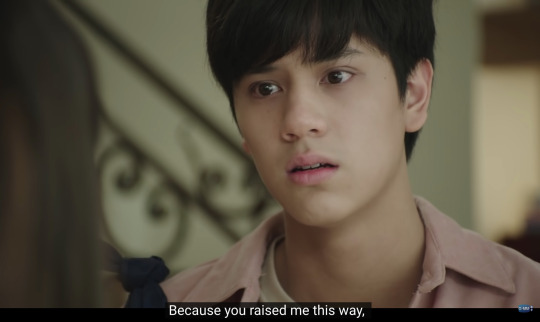
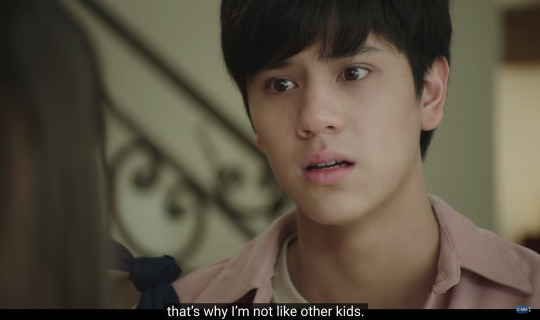
In Pran's first separation from Pat -- Pran did not have personal agency. He did have agency later on, as he moved to Singapore, which again, I'll contemplate in a further meta.
Two instances where I was impressed by protagonists leveraging their agency vis à vis temporary separations from their partners was in Until We Meet Again and in I Promised You The Moon.
UWMA's Pharm was first and foremost presented as a blushing maiden. HOWEVER: Pharm demonstrated quite a bit of sexual agency early in the series. He was forward in his crush on Dean. He contemplated openly being gay. And he wasn't afraid to push Dean away when Dean was moving too fast sexually.
At the end of the series, after Dean and Pharm have resolved their spiritual connection vis à vis the embodied spirits of Korn and Intouch meeting once more -- Pharm wants to know if the love between him and Dean is real, and independent of the influence of the spirits of Korn and Intouch. So: Pharm asks for a break.
Throughout UWMA, Dean is the obvious seme, and Pharm is the blushing uke. I squealed in DELIGHT when I first watched Pharm asking for the break. Yes, Pharm loved Dean -- and what I saw in Pharm's asking for a temporary separation was truly out of that love, to confirm between the both of them that their relationship was very much indeed a forever relationship. God, I get chills thinking about it: Pharm was safe enough in his sphere with Dean to ask for and to GET the agency-driven space that HE NEEDED to feel fully confident in the relationship. That was a risky move that paid off for the two guys in dividends in the end. Dean had no choice but to say yes there.
The fabulous Oh-aew in I Promised You The Moon goes even further than Pharm. He fucking breaks up with Teh! After Teh cheated on Oh-aew! YES, HOMEY, YES! No wibbling on Oh-aew's end. Oh-aew was devastated, yes. But he knew he had to have Teh out of his life in that moment, for the sake of Oh-aew's own happiness, growth, and development. He even rejects Teh's reach-out at the end of their college careers.
What stuck me as so golden about the ending of IPYTM was that that break-up wasn't actually presented as temporary. They were apart for OVER A YEAR (thank you kindly to @shortpplfedup for the temporal fact-check!). Oh-aew held his ground. He needed his time and space. He needed to grow! And he valued that, individually.
I'm celebrating these two instances of agency-driven separations because of the style of their intention vis à vis the protagonists asking for, needing, and leveraging these separations. With the economic and involuntary separations I talked about earlier -- it's like there was a higher need, whether it was for money, a better career opportunity, fear, or selfishness on the part of a family to create the separation.
With Pharm and Oh-aew: the separations they demanded were purely personal and for their own growth. We know now that Pharm and Oh-aew get their endings with their partners. Pharm has a purely happy ending with Dean in Between Us. Oh-aew's ending with Teh is open-ended -- we don't know what chaos Teh will wreak next -- but at least we know they're navigating that chaos together again.
The last drama I wanted to take a look at regarding pain, trust, and separation is the fabulous movie continuation of Cherry Magic: 30 Years of Virginity Will Make You a Wizard?! (I always love writing ?! whenever I talk about Cherry Magic, lol).
The central separation in the movie of the two protagonists, Adachi and Kurosawa, comes about when Adachi is transferred to Nagasaki for work. As @neuroticbookworm and @lurkingshan can attest to: a Western viewer of Japanese BLs will often find themselves screaming to a screen, "JUST TALK ALREADY!," and a uniquely common aspect of Japanese doramas is that so much of communication in Japanese culture is silent, unsaid, kept internal by collectivist social pressures to not make waves with another person -- which automatically creates ongoing questions of trust between partners. When Adachi (Akaso Eiji) shares with Kurosawa (Machida Keita) that Adachi will be moving, Kurosawa shares in words that he's happy for Adachi, but through very simple body language, communicates that he is feeling otherwise.
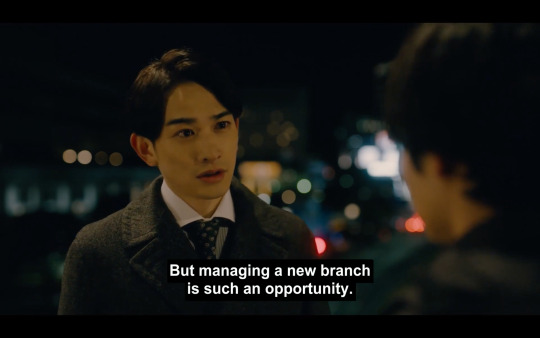
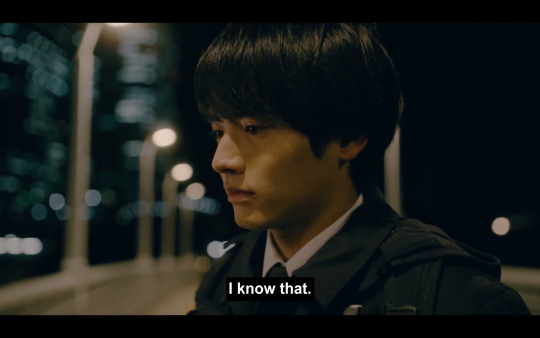
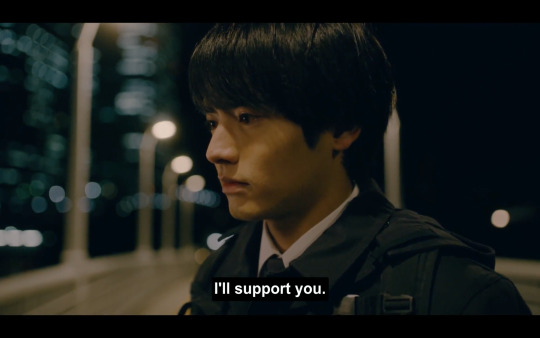
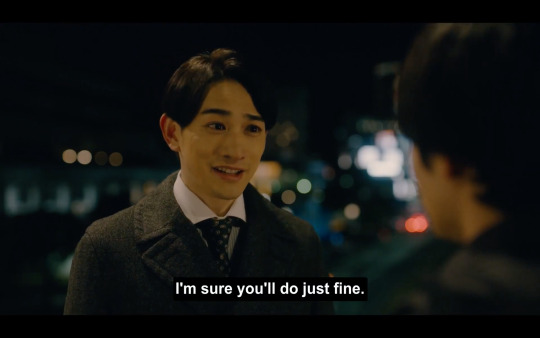
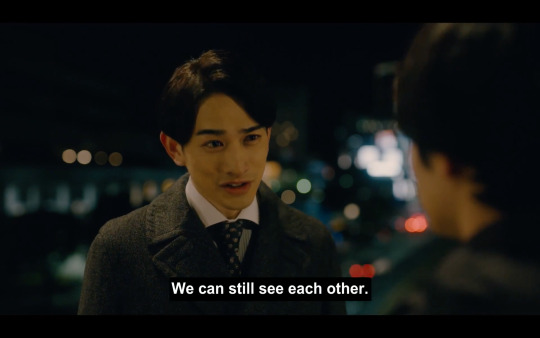
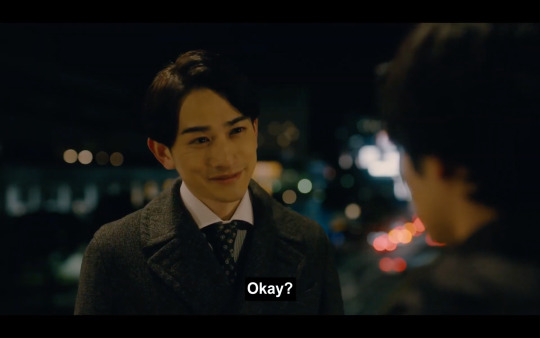
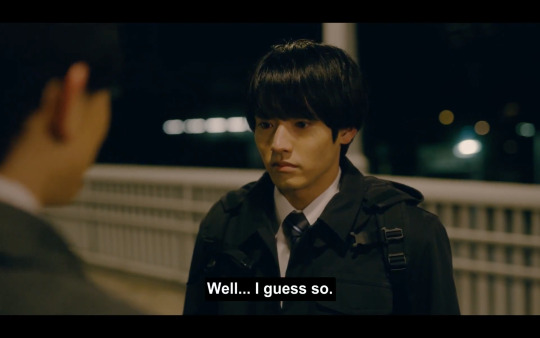
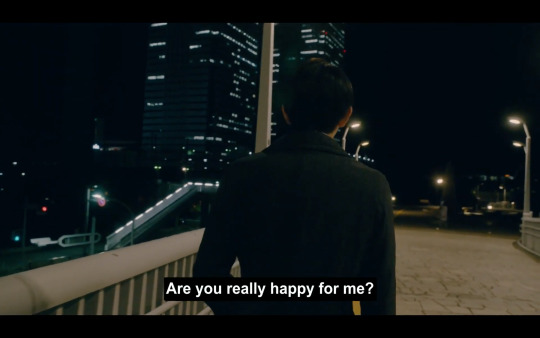
Later in the movie, Adachi gets into an accident in Nagasaki, and Kurosawa rushes to be by Adachi's side. Kurosawa is clearly traumatized. And Kurosawa finally reveals his feelings about the entire situation -- a rare display of direct emotional confession.


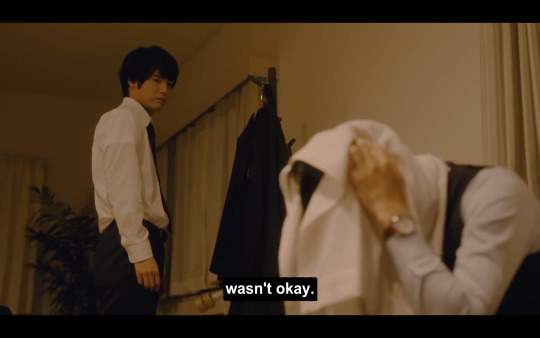
We think that Adachi moved to Nagasaki for this job opportunity -- separating himself from the incredibly devoted and head-over-heels-in-love-with-Adachi Kurosawa. Adachi knows well enough that Kurosawa is suffering in this separation. But later in the movie, after Adachi has moved back with Kurosawa, do we learn Adachi's true intentions. Adachi wants to make himself invaluable at work -- so that Adachi's and Kurosawa's shared company will not separate them if the company finds out about their relationship.
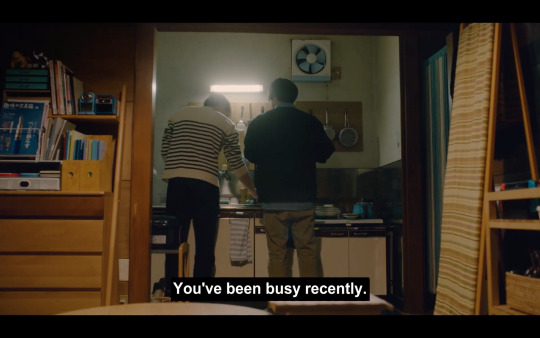

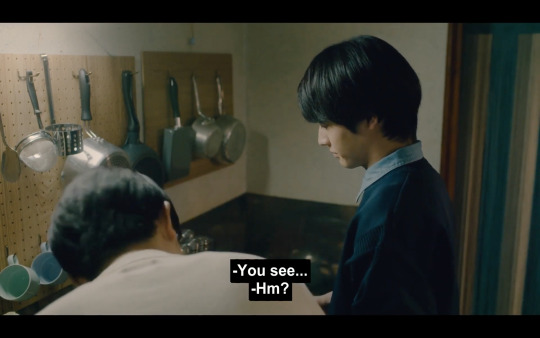
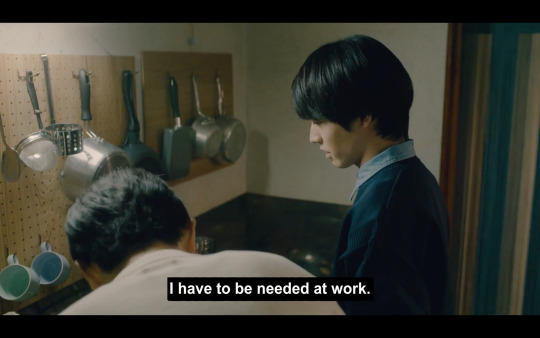

This particular conversation between Adachi and Kurosawa -- after their separation, after they've moved in together -- is a huge turning point in the movie for Adachi, who had usually been the reluctant uke in their relationship prior to this moment. In this conversation, Adachi expresses his fear that outside forces will eventually separate them, and he wants to do what he can to ensure the safety of their relationship.
To me, this is incredibly reminiscent of the compromises Pran and Pat make in Bad Buddy to keep their relationship secret -- another theoretical "separation" -- from their parents for the health, safety, and viability of their relationship.
As well, this conversation between Adachi and Kurosawa moves forward into Adachi's desire to come out to their families. He was inspired by the immediate aftermath of the accident, in which Kurosawa was the last person to find out that Adachi had gotten hurt -- only after Adachi's family and company were notified.
The nuances of this separation between Adachi and Kurosawa -- and what the separation LED TO, which was an eventual and permanent commitment between Adachi and Kurosawa -- are incredibly layered. Adachi made an economic separation from Kurosawa. But it was also rooted in his desire to acclimate his company to his company's dependence on Adachi, so that the company would choose Adachi's contribution to the company over the potentially taboo reality of his same-sex relationship with a colleague in Kurosawa. In other words: he wanted to leverage the separation and his work performance upon his return, to render the company no choice in choosing Adachi's economic performance over his personal and private choices.
(One insight into Japanese culture is that for decades, Japanese corporations have wanted their employees to be married, to complete a seamless connection between household and "office" families. The Japanese BL Kinou Nani Tabeta?/What Did You Eat Yesterday? makes reference to the fact that the main protagonist, Shiro, becomes an independent lawyer because, as a gay man, he may have been pressured to take a wife in another, more group-oriented corporate setting.)
AND, following this, Adachi wanted to come out to his and Kurosawa's families, to also acclimate them to their relationship, so that their families would also not threaten the sanctity and safety of their relationship. And his gamble worked -- and their families accepted them, and they were able to make a permanent commitment to each other.
Without a strategically economic separation, Adachi and Kurosawa could not have achieved key moments of communication that led to their ability to find safety in their external environments, and make a personal and private permanent commitment to each other. The separation to Nagasaki was Adachi's lever to move their relationship forward.
It's so nuanced, so layered, and so strategic on Adachi's end, to use the work separation and his commitment to his company as such a motivator to propel his relationship forward and permanently with Kurosawa -- especially vis à vis the unique nuances of spoken and unspoken communication in Japanese society, which are remarkably different than the styles of communication we see in Thai dramas.
In Pran's and Pat's conclusion in the Thailand of Bad Buddy, they go in the opposite direction: for the sanctity and safety of their relationship, they act out a break-up scenario (with Dissaya telling Pran, "come back to your family," ha), and keep their committed relationship a secret. And this happens *two years* before the context of an actual, physical separation when Pran decides to move to Singapore after graduation.
It's a bit of a switcheroo from what we'd expect by way of open vs. closed communication between Japan and Thailand. But both scenarios, from Cherry Magic to Bad Buddy, work brilliantly well to ensure that all relationships are safe and solidified.
I'm not sure that I can say, globally, that separation from one's nuclear family, or separation from a partner, are common occurrences in manifested everyday reality. As I mentioned before, the economies of many countries are dependent on the physical separation of their citizens to other locales to send back monetary remittances. But more often than not -- when partners are partnered, they tend to want to stay by each other's sides.
I love that many Asian dramas do not shy away from the many realities as to why partners or children may be voluntarily or involuntarily separated from loved ones. Our beloved dramas show us the devastation of involuntary separations, as rendered by Dissaya unto Pran. We see that economic separations can actually LEAD to a solidifying of relationships in the case of Adachi and Kurosawa. We see that family-motivated separations, in the cause of Phupha and Tian, simply needed the investment of time for their relationship to reach a point of comfortable commitment. We see that agency-driven separations by Pharm and Oh-aew can lead to emotional clarity. And, we see that theoretical, secret-kept "separations," of the kind that Pat and Pran created for themselves, to protect their relationship, were risks worth taking, simply for them to be together and happy.
Pain and happiness are not emotions independent of each other. At least in the eyes of my Asian cultures, human beings embody all emotions, all the time. Humans are certainly primed, internally and socially, to seek happiness and balance. But as I've posited here in this post -- is there pleasure without pain? The pain of separation, the trust that partners and family members can learn from each other through separation, and the lessons and communicative ability to solidify relationships after the obstacles of separation, are all themes of life that, I think, are worth unwinding on, in glorious emotional detail. And I love that our beloved Asian dramas do not shy away from these examinations.
(Tagging @dribs-and-drabbles and @solitaryandwandering by request! If you'd like to be tagged, please let me know!)
[Well, this one was a doozy -- if you got through it all, I thank you! Next up, next week, is another post I've been dying to write for months. I had the opportunity to engage in lengthy conversation with a number of FABULOUS Asian Tumblr bloggers, all of us Bad Buddy stans, to reflect on our experiences as Asian reviewers watching BBS and to talk about what we related to. I have a list, a WHOLE LIST! of themes to expound on. I'm calling it Asian Cultural Touchpoints Within Bad Buddy. And I may need to split it into two posts, because there's a lot to talk about. Join me and my friends next week in our continued Bad Buddy brain-rot sesh!
Here is the status of the Old GMMTV Challenge watchlist. Tumblr's web editor loves to jack with this list; please head on over to this link for the very latest updates!
1) The Love of Siam (2007) (movie) (review here) 2) My Bromance (2014) (movie) (review here) 3) Love Sick and Love Sick 2 (2014 and 2015) (review here) 4) Gay OK Bangkok Season 1 (2016) (a non-BL queer series directed by Jojo Tichakorn and written by Aof Noppharnach) (review here) 5) Make It Right (2016) (review here) 6) SOTUS (2016-2017) (review here) 7) Gay OK Bangkok Season 2 (2017) (a non-BL queer series directed by Jojo Tichakorn and written by Aof Noppharnach) (review here) 8) Make It Right 2 (2017) (review here) 9) Together With Me (2017) (review here) 10) SOTUS S/Our Skyy x SOTUS (2017-2018) (review here) 11) Love By Chance (2018) (review here) 12) Kiss Me Again: PeteKao cuts (2018) (no review) 13) He’s Coming To Me (2019) (review here) 14) Dark Blue Kiss (2019) and Our Skyy x Kiss Me Again (2018) (review here) 15) TharnType (2019-2020) (review here) 16) Senior Secret Love: Puppy Honey (OffGun BL cuts) (2016 and 2017) (no review) 17) Theory of Love (2019) (review here) 18) 3 Will Be Free (2019) (a non-BL and an important harbinger of things to come in 2019 and beyond re: Jojo Tichakorn pushing queer content in non-BLs) (review here) 19) Dew the Movie (2019) (review here) 20) Until We Meet Again (2019-2020) (review here) (and notes on my UWMA rewatch here) 21) 2gether (2020) and Still 2gether (2020) (review here) 22) I Told Sunset About You (2020) (review here) 23) YYY (2020, out of chronological order) (review here) 24) Manner of Death (2020-2021) (not a true BL, but a MaxTul queer/gay romance set within a genre-based show that likely influenced Not Me and KinnPorsche) (review here) 25) A Tale of Thousand Stars (2021) (review here) 26) A Tale of Thousand Stars (2021) OGMMTVC Fastest Rewatch Known To Humankind For The Sake Of Rewatching Our Skyy 2 x BBS x ATOTS (re-review here) 27) Lovely Writer (2021) (review here) 28) Last Twilight in Phuket (2021) (the mini-special before IPYTM) (review here) 29) I Promised You the Moon (2021) (review here) 30) Not Me (2021-2022) (review here) 31) Bad Buddy (2021-2022) (thesis here) 32) 55:15 Never Too Late (2021-2022) (not a BL, but a GMMTV drama that features a macro BL storyline about shipper culture and the BL industry) (review here) 33) Bad Buddy (2021-2022) and Our Skyy 2 x BBS x ATOTS (2023) OGMMTVC Rewatch (The BBS OGMMTVC Meta Series is ongoing: preamble here, part 1 here, and more reviews to come) 34) Secret Crush On You (2022) [watching for Cheewin’s trajectory of studying queer joy from Make It Right (high school), to SCOY (college), to Bed Friend (working adults)] (watching) 35) KinnPorsche (2022) (tag here) 36) KinnPorsche (2022) OGMMTVC Fastest Rewatch Known To Humankind For the Sake of Re-Analyzing the KP Cultural Zeitgeist 37) The Eclipse (2022) (tag here) 38) The Eclipse OGMMTVC Rewatch For the Sake of Re-Analyzing an Politics-Focused Show After Not Me 39) GAP (2022-2023) (Thailand’s first GL) 40) My School President (2022-2023) and Our Skyy 2 x My School President (2023) 41) Moonlight Chicken (2023) (tag here) 42) Bed Friend (2023) (tag here) 43) Be My Favorite (2023) (tag here) 44) Wedding Plan (2023) 45) Only Friends (2023) (tag here)]
#bad buddy#bad buddy the series#bad buddy meta#bad buddy the series meta#backaof noppharnach#aof noppharnach#nanon korapat#ohm pawat#ohmnanon#patpran#pran x pat#pat x pran#still 2gether#a tale of thousand stars#atots#our skyy 2 x bad buddy x a tale of thousand stars#cherry magic#cherry magic the movie#until we meet again#i promised you the moon#i told sunset about you#ipytm#itsay#moonlight chicken#the bbs ogmmtvc meta series#turtles catches up with the essential bls#turtles catches up with thai bls#turtles catches up with old gmmtv#the old gmmtv challenge#ogmmtvc
90 notes
·
View notes
Text
Photography in Aof's Series
I have been thinking a lot about cameras and queer visibility since @dudeyuri's tags on this post and @miscellar, @respectthepetty, and @telomeke's following discussions. In Bad Buddy and He's Coming to Me, the motif of the camera plays with the ideas of public vs private aspects of the character's relationships and how open and visible they are able to be. I think this is very true in BBS and HCTM, but it is also a recurring theme in Aof's shows.
Bad Buddy and He's Coming to Me
I am not going to delve too far into these shows because I think @miscellar and others have already written brilliant posts about this linked above. @miscellar makes a wonderful point about photography being seen as a hostile act in most of Bad Buddy because Pat and Pran are trying to hide their relationship, but the context changes when Ink is taking the photo: "ink's camera sees them for who they really are, and more than that, it affirms their relationship." Who is taking the picture changes its meaning, which I think can be extended to discuss queer media more generally, how directors using a queer lens will portray queer stories in more nuanced and/or realistic ways.
In He's Coming to Me, we have the theme of public vs private queerness with Thun taking a selfie with Mes but Mes is of course not visible. Not sure if I have anything to add here, but I do think this fits into the many other scenes where Thun does absolutely nothing to hide the fact that he's talking and hanging out with a ghost. They're hiding in plain sight but no one else sees what they do. This could be a comment on how often people overlook queer relationships or devalue them.




Dark Blue Kiss
In Dark Blue Kiss, Pete photographs Kao a lot, and he doesn't do this in secret. Unlike Pat and Pran who aren't even supposed to be friends, Pete and Kao have that act to disguise their relationship, so they are able to do some parts of their relationship in public. In episode 3, Pete takes Kao's photo in front of a horse and buggy ("You said you like taking photos of views." "You're in every view I see." "Smooth."). Right behind them we see other people also taking photos, including someone taking a photo of two people who look to be a couple, contrasting Pete and Kao with the visibility that straight people get to enjoy.
But while we do have public photography here, because their relationship is hidden and Kao isn't out to his mom, he hides the photographs. In Pete's room, there is a photoboard with lots of photos of the two of them or them separately. Pete doesn't have to hide the relationship in his own home because he is out to his dad and his dad is incredibly supportive.
Kao, on the other hand, primarily has his room decorated with posters about math (this is yet another Aof show where a character has 1 interest and it becomes their entire room décor). But he does keep all the photos, even if he can't display them.
He reveals them at their anniversary surprise when he decorates a whole room with pictures of them together. This moment shows that even though Kao isn't able to be completely open about their relationship, he still wants to put in the effort to show his love, even if it is only possible in an empty school room that no one else will see. While this moment is sweet, there's a thread of sadness behind it because being open to the world is such a huge point of concern in their relationship for the whole series.




Moonlight Chicken
Heart and Li Ming take photos together multiple times, and their comfort with this I think speaks to @telomeke and @waitmyturtles point about how this show is about generations and their different experiences of queerness (x), and so it is an important counterpoint to Jim and Wen that Heart and Li Ming are fairly openly affectionate with their friendship and then their relationship, within safe spaces. For example, they ask Wen to take a photo of them in the food court (Wen who acts as an observer throughout most of the show), and in this interaction Wen sees that there is more to their relationship than friendship. In this way, I think he acts in a similar role to Ink.
I also think it is noteworthy that Wen and Alan have so many photographs of each other, and then their break up scene takes place right in front of the photoboard that is a monument to the good times of their relationship. Wen starts with his back to the board, facing away from that history, and then the framing moves to have the board in between them. The traces of the past are literally acting as a wedge between them as they fight over it. And then that board remains in the apartment, with the photos taken down, as a continued reminder of what used to be there. The love that no longer remains.
There's an interesting parallel between Jim and Wen's conversation on the pier and the scene I talked about before in Dark Blue Kiss. While they discuss the Marina Food Court, there's tension between them, with Wen's guilt in his role in the project affecting Jim's diner and Jim still putting as much distance as he can between himself and Wen. In the background we see a two people, potentially a couple, taking photos. They are wearing almost the exact same colours as Jim and Wen. Their happiness in this scene seems like a direct contrast to the sadness Wen and Jim are expressing, hinting at what they might have when they get past this disconnect. And then once they do get together, Jim and Wen take their own photo together at the beach.




Our Skyy 2 x A Tale of a Thousand Stars
In these special episodes, as the brilliant @wen-kexing-apologist has discussed in their incredible essays (x, x), the main journey of the special surrounds Phupha becoming more comfortable being a partner to Tian in public and being more open with Tian in general, working through a lot of internalized homophobia. This is once again demonstrated using the photography motif.
Phupha takes photos of Tian taking photos of the food in the café, a date during which he is initially uncomfortable with how public they are. He is slowly getting used to how this feels to be so open. But he does push past the discomfort because he knows that this is important for Tian, and important for himself as well.
The next stop on their date is to a photobooth, which an interesting liminal space between public and private. Inside the booth they are alone, but it's still in a very public space, and anyone walking past could see them coming out together, or could look at the photo strips as they're printed out before Tian and Phupha have a chance to collect them. The public and the private are slowly becoming enmeshed.
Tian and Phupha then take a photo with Ink, Pa, Pat and Pran after the play. This is the most open they are with photography, Tian's hand resting on Phupha's shoulder, standing close. This is also an opportunity for Pat and Pran to be in a photo together publicly, like the play itself. Like I talked about regarding the play, it's important that all the people in this picture are queer, and that this creates a safe space to blend the boundaries between public and private sides of their relationship.




I also think it's important to consider when talking about photography, the role that the camera plays as a stand-in for the audience. We are getting this glimpse into the characters relationships, both public and private, and the cameras we see within the scenes can often reflect queer media and queer visibility more generally.
#made my own post bc this got long#he's coming to me#bad buddy#dark blue kiss#moonlight chicken#our skyy 2#a tale of a thousand stars#i have not seen zero photography yet so assume there is even more there and hope that someone can speak to that!#i have probably gotten details wrong and missed stuff because i'm working from memory#a tale of thousand stars#thinking thoughts#taking any opportunity i can to talk about moonlight chicken some more#bad buddy meta#he's coming to me meta#dark blue kiss meta#moonlight chicken meta#a tale of thousand stars meta#our skyy 2 meta
149 notes
·
View notes
Text
𝗠𝗮𝗻𝘆 𝗼𝗳 𝗚𝗮𝗹𝗲'𝘀 𝘃𝘂𝗹𝗻𝗲𝗿𝗮𝗯𝗶𝗹𝗶𝘁𝗲𝘀 𝘄𝗲𝗿𝗲 𝗮𝗴𝗴𝗿𝗮𝘃𝗮𝘁𝗲𝗱 𝘁𝗼 𝗱𝗲𝘃𝗲𝗹𝗼𝗽 𝗶𝗻𝘁𝗼 𝘁𝗿𝗮𝘂𝗺𝗮 𝗿𝗲𝘀𝗽𝗼𝗻𝘀𝗲𝘀, 𝗿𝗲𝘀𝗽𝗼𝗻𝘀𝗲𝘀 𝘁𝗵𝗮𝘁 𝗠𝘆𝘀𝘁𝗿𝗮 𝗮𝗰𝗰𝗲𝗽𝘁𝘀 𝗹𝗶𝘁𝘁𝗹𝗲 𝗰𝘂𝗹𝗽𝗮𝗯𝗶𝗹𝗶𝘁𝘆 𝗳𝗼𝗿. This lengthy headcanon will refer to canon dialogue from mostly Gale, sometimes others. Reader's discretion is advised. There will be in depth explorations into grooming, emotional abuse, heavy manipulation, and suicide.
First, let it be said that Gale, a mortal man, will always be the powerless one in his dynamic with Mystra. Of course, nearing forty years of age, he remains entirely responsible for his own actions, his own blunders and every hurt he'll cause, but it's important to remember who formed much of who he is: his goddess, his deity, and egregiously, his lover.
Mystra is power. Mystra is possibility. She knows what sway she holds over her Ioyal, vulnerable, and entirely mortal followers. In all ways that matter, they are but lambs she can steer and herd as she sees fit. She knows they can't deny her and knows they'll never want to. Gale's sheer servitude and complete devotion. Mystra, knowing that, used him to filth.
Gale: I was just... practising an incantation. Player Character: No, there's more to it than that. I know devotion when I see it. Gale: What can I say? She's—she's Mystra. I can't describe it, the need I sometimes feel to see her - to draw the filaments of fantasy into existence... Mystra is all magic. And as far as I'm concerned, she is all creation. Player Character: I didn't realize the depth of your devotion. Gale: Magic is... my life. I've been touched with the Weave for as long as I can remember. There's nothing like it.
Gale, orb in his chest, doomed to be eaten by the very thing he loves the most, still speaks so reverently of the goddess, of his lover that has left him to die. He conjures images of her memory—and she is all the while forgetting about his.
Minsc: Gale reminds me of vremyonni of my homeland. The man-mages of Rasheman. While the girl-folk go on to rule as wychlaran, Weave-touched boys were hidden away. Trained to work their craft in silence and secrecy. It is an old custom, not well-observed. In truth, I thought it born of caution after some catastrophe of wizardly men-folk of old. Now, I wonder if it was not done to hide them from Mystra, and the snares she sets for young and prideful boys, hm?
Tales of Mystra's treachery spreads far, leaving those familiar waters surrounding Gale's tower in Waterdeep. They whisper her name, afraid to utter it one time too many, suspecting, perhaps, that she'll show in their mirror like some Faerûnian Bloody Mary.
Talent rouses Mystra. She can see who uses the gift of the Weave and feel them, sampling whatever delight sings their veins as they pull from her domain. Not unlike a spider, she'll follows every tremor that strikes her as just a sliver more profound; and Gale, a prodigy, plucked the Weave's web to so garner her focus. And like some black widow scurrying, she surged down that ripple to prey on a boy. There, Gale, so impressionable, was just a mite older than twelve whole summers. He sat so stunned, beholding Mystra as she lured him into the cradle of her Astral domain. Bathed in her magic, pleasantly coddled within that glittering cosmos, Gale felt blessed in a way he'll struggle always to recount, no word, no language, fit to describe it. He felt chosen. He felt seen. And potently, to a child, he felt loved. Now, imagine a child experiencing something like that. Imagine what they'd think, how brilliant they must be when stood beside the rest. She told him he was gifted, made his heart swell not unlike a child's appetite for praise. She knew what she was doing by offering these morsels, by preying on a child's most delicate mind, and Gale, child prodigy, was already so awash in the idea that his value was in magic. Unfortunately, Gale, susceptible, had no way of squirming out of his goddess' grasp.
Reality: She's laid down the seeds to creep into his heart. When he's just old enough—seventeen's sufficient, she thinks—she stakes her claim and makes him hers.
Gale: My virtuosic talent once caught the eye of the goddess of magic herself, Mystra, who named me her chosen and her lover.
Gale is stunned when she takes him to bed the first time. (Is this really happening?) Mystra claims his mouth in a kiss, taking everything she knows he offers so willingly. Mystra, of course, is not so stunned.
Dream Visitor: An elder brain... one of the cruelest and most powerful creatures in existence, enslaved by mere mortals. Gale, tasked with Mystra's missive to sacrifice himself: This is it... I must do as Mystra commands.
Gale has worryingly low self-esteem beyond his magic. As already explored, his entire worth as a man hinged on and was built entirely off his talent as a wizard. He fought tooth and nail for any crumb of affection Mystra would offer his way, something she only gave him at all seeing his gift as a child. He wants her forgiveness. He desires it genuinely. He believes so firmly that he has wronged his goddess, buying into the idea that sacrificing himself will right his wrong. She holds such dominion over him, making him reduce his confidence in himself into a mere, trifling pittance; after all, she wasn't just his lover, but the patron deity he prays to. And regardless, Gale is a people pleaser, his initial acceptance of her missive coming as no surprise.
After all, Gale, at times, goes to incredible lengths to appease his audience. This habit, compulsion, impulse, whatever you want to call it, is a quality that was relentlessly exacerbated in his relationship with his immortal paramour. He wanted to content her, felt all he did was never enough, for as a matter of principle, he was oceans, leagues, and entire galaxies beneath her. Gale figures: well, how can a short-lived dalliance satisfy a god? He had to make her happy. Indeed, he'd done everything she'd ask. He'd bedded her how she liked, kissed her how she wanted, and of course, even said those words she'd said tasted best. She was his lover, a lover that never tended to his own needs and pleasures, and he fooled himself into thinking that's enough. He won't bend backwards for everyone, mind you, but if you're of the ones he would, he would stop at nothing to make you happy. After all, people pleasing is a way to keep oneself safe, a trauma response to sidestep discomfort, and though it achieves only a direly tentative peace, when that is all you've been fed, you will pursue it.
Gale did not want to lose Mystra; he couldn't bare the sting of it. And so, when Elminster visited him, Mystra's call for his death offered oh so callously, Gale, heartbroken, felt that part of him kick up. He couldn't endure the guilt, was so hungry for a chance to let his weighty heart breathe, even if it meant dying in the process.
At least this way, he'll finally do something right. At least this way, Mystra will forgive him, and all his friends will survive.
Gale: After I was afflicted with my condition, I locked myself in my tower for an entire year. I was inconsolable, wallowing in my self-inflicted tragedy. I'd given up on myself.
As a byproduct of people pleasing, Gale, too, is all too quick to accept all guilt. He self-deprecates, gaslights himself to a venomous degree, and twists his reality in so cruel a way as to make him the villain Mystra'd led him to believe. He self-flagellates himself, the first one in the world who will throw Gale of Waterdeep a mental punishment. Mystra's a goddess, after all, seen as utterly faultless, and twined so tightly with a being so mighty in esteem, Gale slipped into the role of the guilty often. When tied with anyone with grandeur like this, so immeasurable in their own self worth, it's important to keep in mind this: you are nothing but a prop in which to fulfill their ego. Gale was not Mystra's, not by a long shot. Rather, Gale was a tool, simply her mortal extension.
And he took every blow meant for her... a common and terrible habit for many people in imbalanced, ego-fueled relationships.
Gale's life beyond her wasn't something that interested her. She took most of Gale's devotion, manipulated his life to be her sole mantle of attention, for Mystra is not a goddess that shares very happily.
Indeed, long before his self-imposed isolation, this jealous deity did well at keeping him isolated.
Player Character: Picture kissing him. With tenderness. Then, with passion. Gale: I... I didn't think— Narrator: You perceive quick-fire embarrassment, trepidation, and finally... elation.
And so, cheated out of love, so reduced in his value as a man and lover both, suffice to say, Gale's slow to believe he can ever be loved. That's what happens when you're with someone so cold, consistent only in their infinite lack of respect. Gale looks at fondness, and he feels—confounded, to be sure. He thinks, is this truly mine to have? He doesn't know what to do, is nearly forty in game, and despite having lived decades devoted to one relationship, he feels, at the same time, entirely out of depth. To be frank, he greets it with embarrassment, like he's been caught red handed with something not his at all. He's like a child caught rummaging with his hand in a cookie jar, all this isn't mine to enjoy, not mine to indulge in, but he thinks, startled, but god, do I want. He wars with disbelief, uncertainty, and need, and in so many ways feeling utterly starved, with just a glimmer of affection, he falls fast into love.
Scenario: (And if properly romanced, it changes his world.)
Gale: In her (Mystra's) likeness, I used to read a thousand stories. She was beauty, wisdom, elegance, power... she contained universes. But now... it is hard to see any redeeming qualities in a lover who condemned you to death. I'd much rather gaze into your eyes than hers. Yours are capable of tenderness and feeling... No god could ever compare.
He says it with sincerity. There is such wonder, such love, and such awe in his eyes. He makes the act of kissing him feel like you've just reached into the trenches to but pluck him soundly from his ruin and despair. You think, Gale Dekarios, how unloved have you been all this time?
Gale: To know you love me for the man I am, and not the magic I command… none have loved me so purely before.
The answer is: entirely.
For so long, Gale thought love was simply being chosen. He knew nothing of being favored for the quality of his character, to be cherished and accepted even in those ways he fumbles and lacks. Again, his needs were seldom met, often treated with utter indifference by Mystra herself, and to meet someone so eager to treasure him, dote on him in a way his heart, his body is somberly new to, raptures his spirit and captures his soul. He's seen for who he is. He's... loved, desired for his silly quips, his easy smiles, and his growing affections. He bares himself to them, and in turn, they cradle his heart like something entirely precious. Gale thinks this has to be dream. He says, at times, you are more than I deserve.
Scenario: (But sometimes, he hopes too strongly and loves too greatly. As it always does, then, like he's once more wanted too much, he watches something beautiful slip right through his fingers. Of course, Gale Dekarios. Of course it does.)
Player Character: I didn't know you felt so strongly, Gale. Gale: Perhaps I should have done more. Been more charming, more flattering, harder to reach... but I was only myself, and sometimes that isn't enough.
They don't love him anymore. It breaks his heart. He hurts so much, so profoundly and deeply, and he doesn't realize that he breaks their heart in turn.
Unable to ever voice his feelings with Mystra in any way that amounted to much, Gale's a tendency to wallow, expressions coming off as potentially 'guilt-tripping' and even, on occasion, passive aggressive. Firstly: Gale NEVER means to manipulate emotions, and he's no intention of twisting anyone's arm, either. Fact is, Gale, never taken seriously when he'd bared his vulnerabilities to the Mother of the Weave, can end up saying just a little too much. He feels very deeply, and for most his life, seldom had an outlet for these weeping sentiments. He sometimes lets slip raw words and oftentimes heart-wrenching expressions; all the same, it's not so pitiful as to shepherd an outcome, but rather, is a gesture taken by a man so desperate to be heard. It may feel like scheming, but the truth is far, far greyer: feeling as though he's no right to share the depth of his heart, Gale simply lets it geyser out in a way he can't cork up. In ways he doesn't realize, he's adapted to this ache, passively reacting so his feelings can at least be seen and recognized—no matter how pitifully unwhole. With someone who values so little his thoughts... well, when he slips into these moods, one can hardly feign shock.
Situation: (And if no one shows him trust and tenderness, any true care in his character or worth, Gale gets swallowed up by how wronged he was.
He thinks: Let me be a god. Let no one hurt like me anymore.)
Gale: They only want us to serve them, pray to them...and ultimately, to die for them. But what if we didn't need them? What if we wielded their power instead and helped ourselves in all the ways they refuse to? I could make that happen.
Gale is not above anger, and as stated, he is not above pettiness; however, more than that, he is not above righting himself whatever wound he was struck. Gale, if not offered much by ways of affection, understanding, is made to believe that one idea that's lived growing in his mind: Gale Dekarios is far from sufficient; he has to be more. He has to be better. Gale, in such an unkind ending for himself, sips too desperately—and perhaps greedily, too, but desperately serves as a far better word—at that idea that he needs power. And so, wresting the Crown of Karsus for himself, he spites Mystra in his own way, becoming a god he feels is leagues better than she will ever be. Damn her thoroughly. Damn her ego, her power, and her endless indifference. He will serve the people, protect them, and in ways Mystra never could, better the world.
Situation: But as a god, he loses all sense of his kindness. Humanity. All who loved him leave him, and even Tara spurns the image he's become. With power, he's gained the respect he thought he always wanted... but in turn, he lost in even greater measure all the love he's known.
Endnote: But healing, knowing to forgive himself and knowing he's deserving of care simply for being Gale Dekarios will remain, always, the best path for him.
#HEADCANON.#Oh... anyway. This. Was. A lot.#And it was a lot for me mentally and emotionally to write.#So much of this hit home.#Gale isn't perfect. He can be petty and immature—a byproduct of not being all too good at venting his frustrations when#it gets to a point. He has very bad self esteem. He is not forgiving of himself and is too forgiving of Mystra.#He endured FOR DECADES the cold indifference of a goddess he called his lover.#I know people dog on him because he's a grown man with these hurts and traumas and responses#but just because his trauma manifested in ways you don't find palatable or hot or sexy#doesn't mean they aren't scars left by trauma buddy!!!#And quite frankly that bit about God Gale sounding vindictive and angry#yeah! SOMETIMES people who have so cold and uncaring and belittling a partner#end up angry. You shoved someone into a corner and hounded them for SO LONG. Don't start crying when they rear back on you and bite#I have a deep connection with godhood Gale. But obviously a healed Gale that finds love and acceptance in himself is so much healthier.#I'm rooting for you Gale (always).#So much of this was typed up with a lot of first hand experience so... to say this was a Gale exploration#as much as a way to navigate my own trauma is an apt one.#No two tales of abuse are alike of course. Gale's experience isn't my experience. But I can sympathize a great deal.#TL;DR: This meta post means a lot to me. K. Thanks.
71 notes
·
View notes
Text

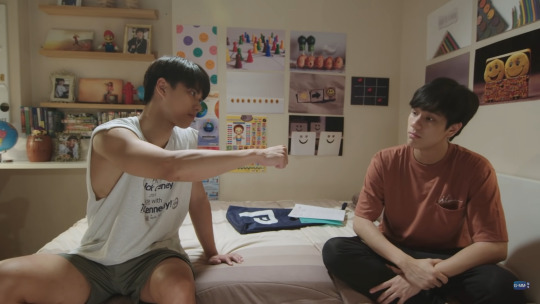

The first fist bump we see in Bad Buddy is between Pat and his dad. Pat's dad has just said he used to protect the girls in his faculty from the nefarious Architecture boys and the two are celebrating his coolness.
Later that episode, Pat comes to Pran to propose a truce in the Engineering and Architecture fight. Pran suggests a plan, Pat agrees, and he holds a fist out to seal the deal. Pran seems surprised at first, but then reaches out and fist bumps Pat. A iconic gesture is born.
I don't have the words or time to get into this right now so you'll just get some ramblings:
the fist bump being a gesture Pat learned from his dad (his macho, "did you win the fight son?" dad)
Pats instinct to seal the deal, a deal that will end the fighting with compromise, is with a gesture learned from his father
Pat taking the tools he learned from his dad (posturing, fighting, being the best, etc.) and using them in a way that better suits who he really is, under everything his dad wanted him to be (compromise, cooperation, connection to Pran)
the way this gesture, the fist bump, becomes THE symbol of Pat and Pran's love, a love that Pat's father cannot tolerate and tries to forbid, and is present at all the important moments in their relationship (the beginning of the bet, the public confession on the stairs, etc.)
the way the first bump becomes not a gesture for brash male posturing, competition, and bonding in the most heteronormative sense (protecting women from other men) but instead a gesture for peace, cooperation, and love, a symbol of a gay relationship that endures despite societal and familiar pressures
146 notes
·
View notes